Scientific Highlights
-
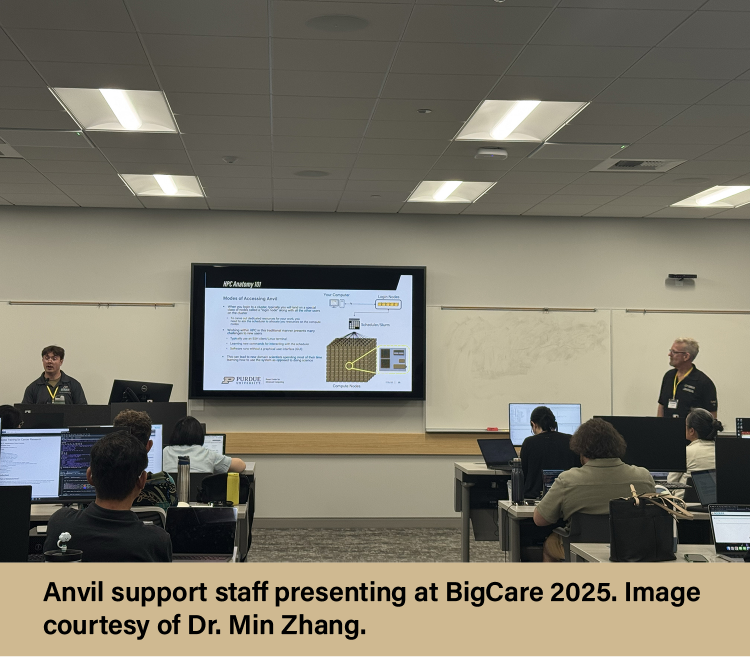
Anvil supports BigCARE 2025 Summer Workshop
Purdue University’s Anvil supercomputer recently supported the 2025 BigCARE Summer Workshop, a two-week course aimed at helping cancer researchers develop big data skills. This year’s workshop took place at the University of California, Irvine (UCI). Throughout the course, attendees learned to manag...
-
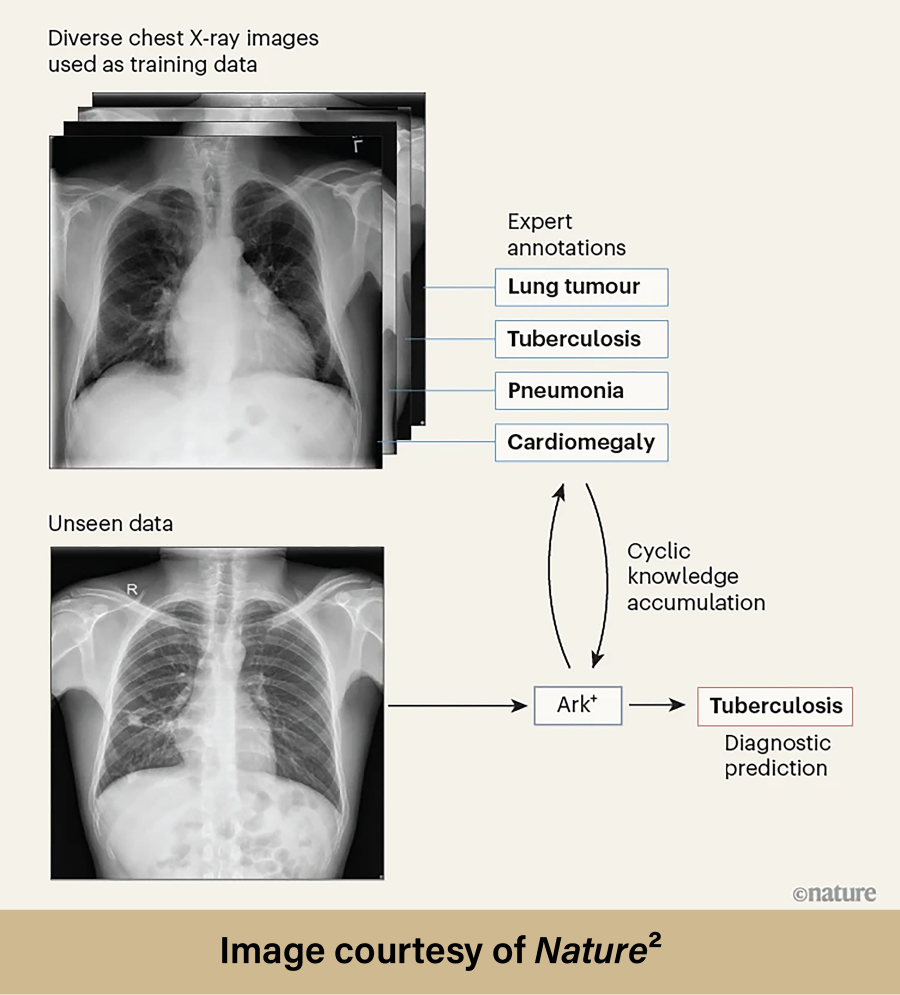
Researchers use Anvil to create AI model for medical image diagnosis
Researchers from Arizona State University utilized the Anvil supercomputer to develop and deploy a fully open AI (artificial intelligence) foundation model for diagnosing diseases based on medical imaging. The new model, called Ark+, was recently published in the July 10 issue of Nature1. Ark+ was a...
-
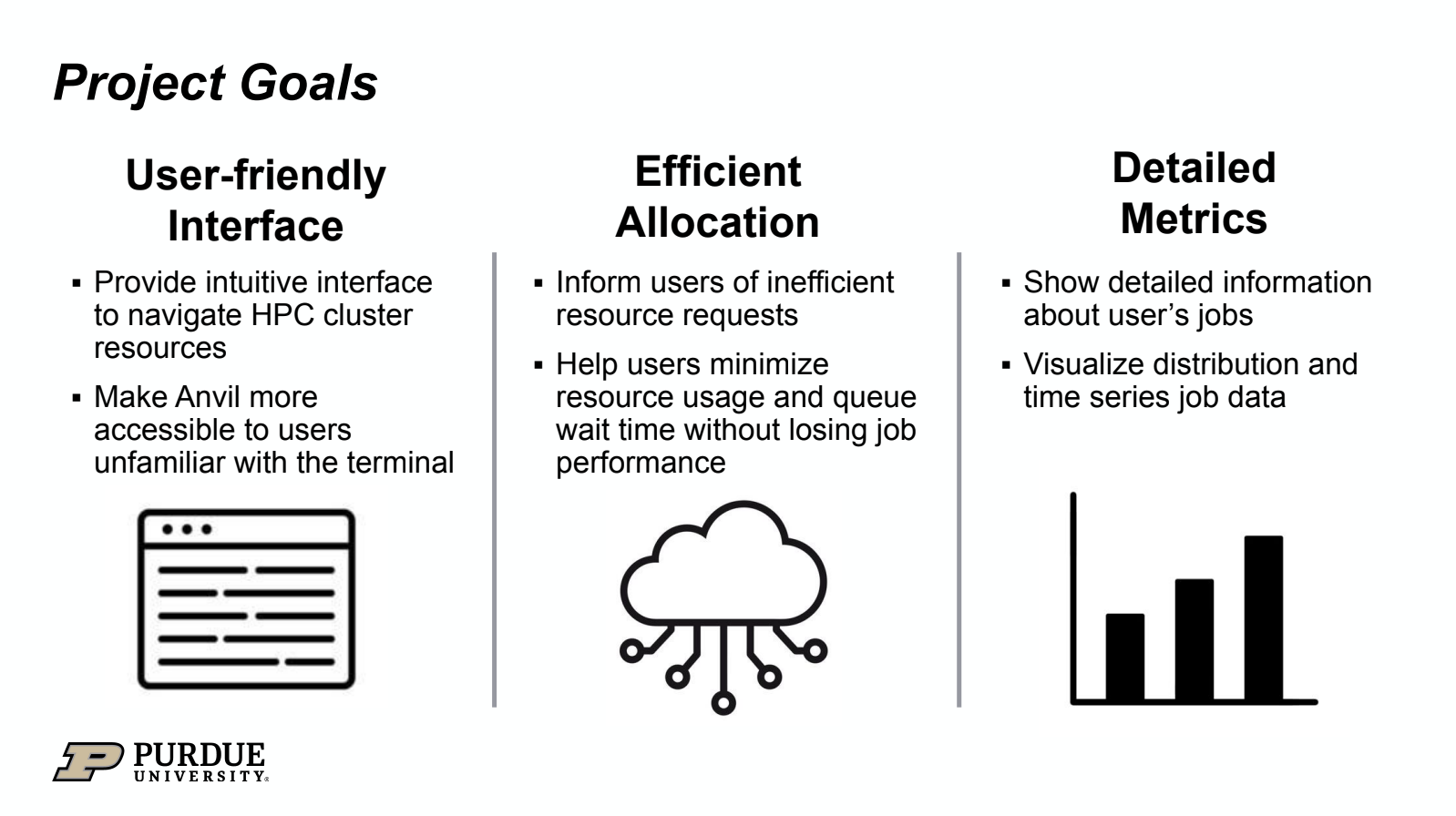
Anvil Open OnDemand Dashboard version 2 enters production
The Rosen Center for Advanced Computing (RCAC) has recently released the second version of their Anvil Open OnDemand (OOD) Dashboard. The Anvil OOD dashboard provides researchers who use the Anvil supercomputer with tools for user-friendly job accounting and performance metrics. Version 2 enhancemen...
-
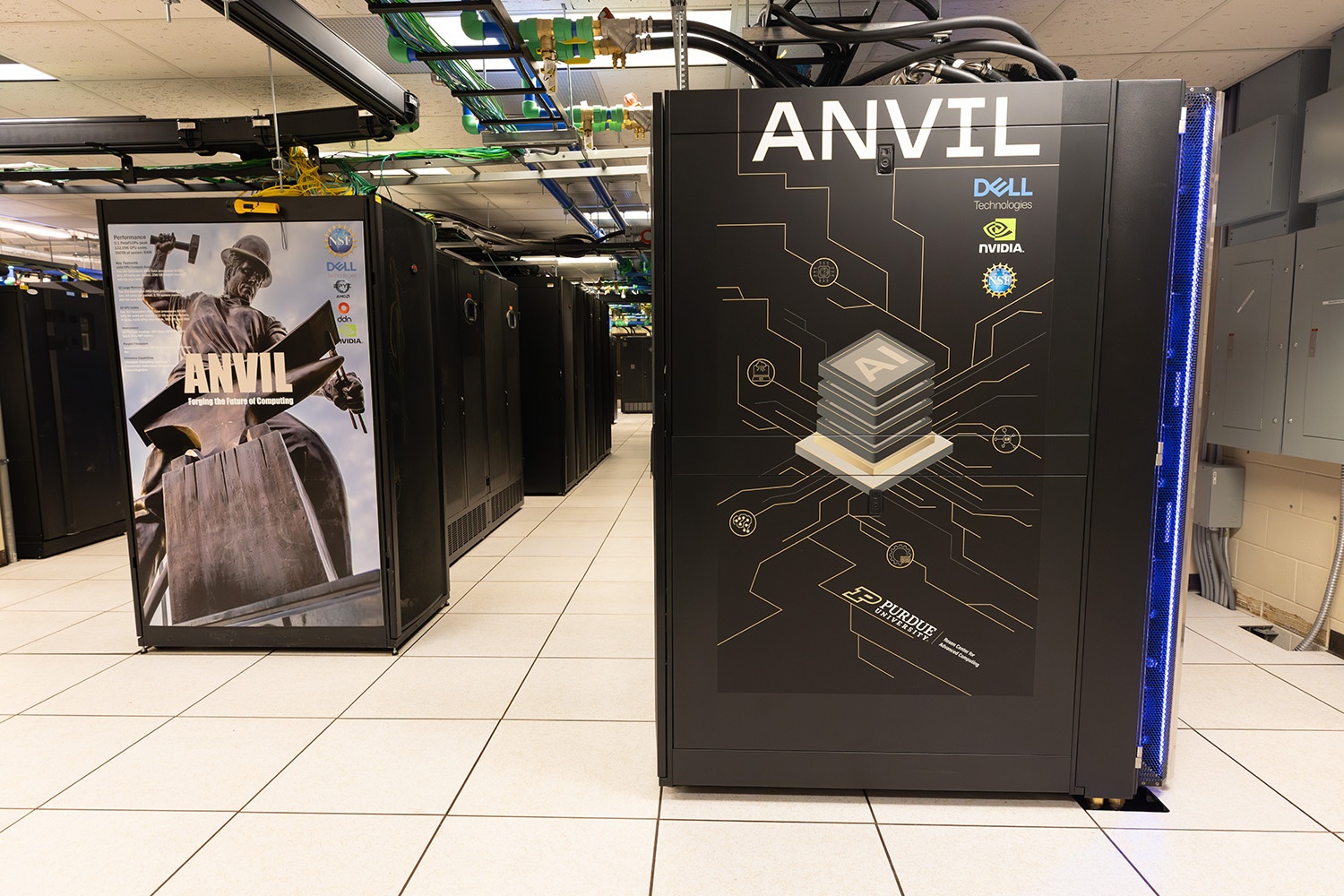
Anvil impact highlighted in National Artificial Intelligence Research Resource Pilot webinar
Dr. Haniye Kashgarani, a Senior AI Scientist at the Rosen Center for Advanced Computing (RCAC), recently gave a presentation for the NAIRR Pilot Partner Series Webinar. Her presentation focused on how Anvil, one of Purdue University's most powerful supercomputers, is helping researchers across the c...
-
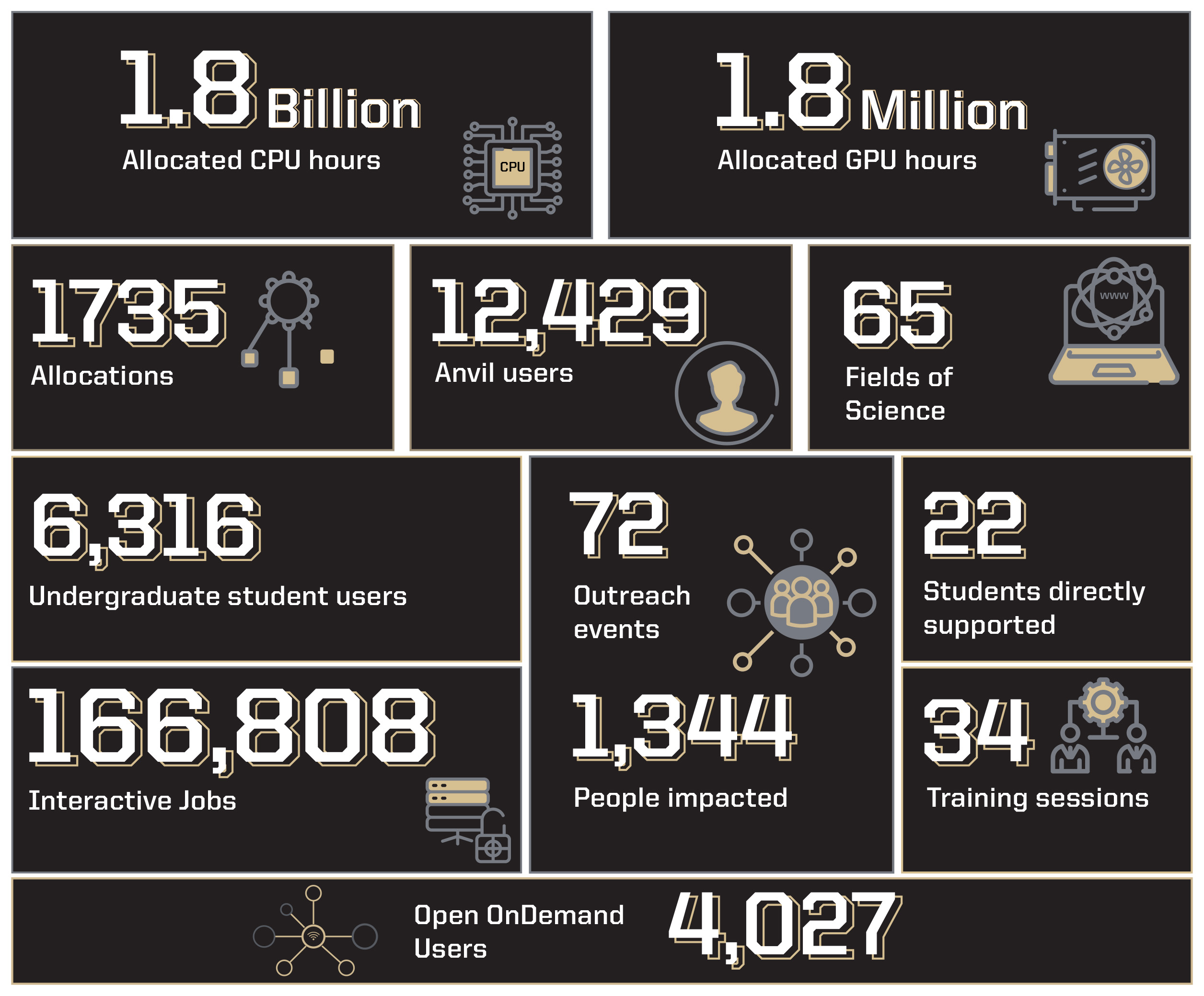
Anvil enters year four of production
Anvil, one of Purdue’s most powerful supercomputers, continues its pursuit of excellence in HPC as it enters its fourth year of operations. Funded by a $10 million acquisition grant from the National Science Foundation (NSF), Anvil began early user operations in November 2021 and entered production...
-
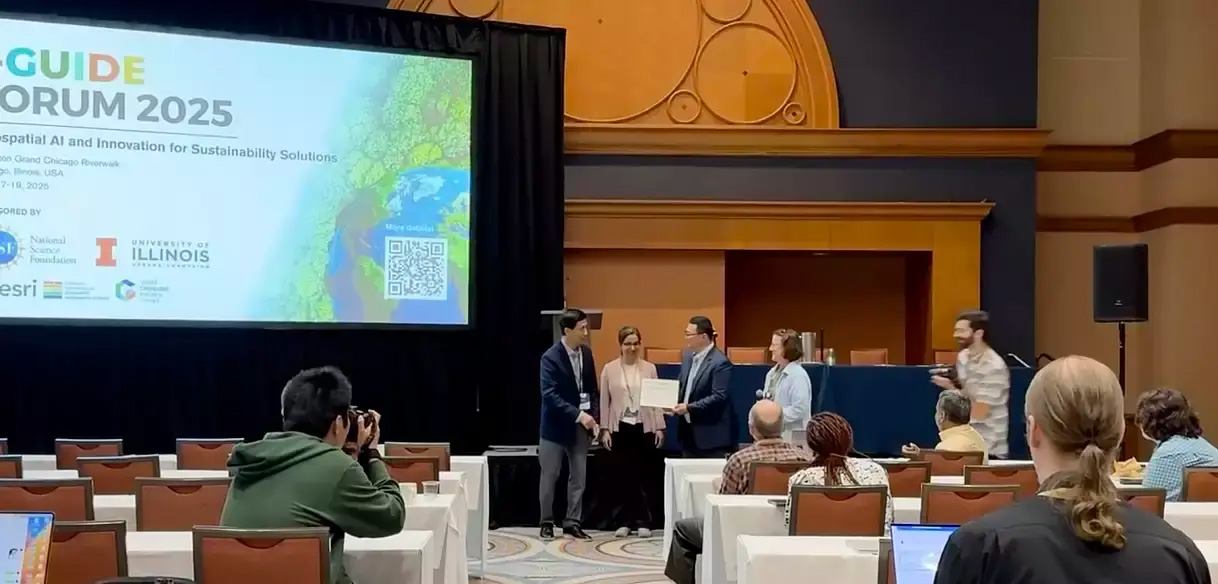
RCAC staff win I-GUIDE Spatial AI Challenge
Two staff members from the Rosen Center for Advanced Computing (RCAC) recently took first place in the I-GUIDE Spatial AI (Artificial Intelligence) Challenge 2024–25. Dr. Elham Barezi, the Lead AI Research Scientist, and Dr. Jungha Woo, a Lead Software Engineer, worked together to develop the winnin...
-

Anvil AI now available to ACCESS researchers
Researchers nationwide can now request access to the Rosen Center for Advanced Computing’s (RCAC) new national artificial intelligence (AI) resource, Anvil AI. Purdue University's powerful national HPC-resource, the Anvil supercomputer, recently received an upgrade, thanks to support from the Nation...
-
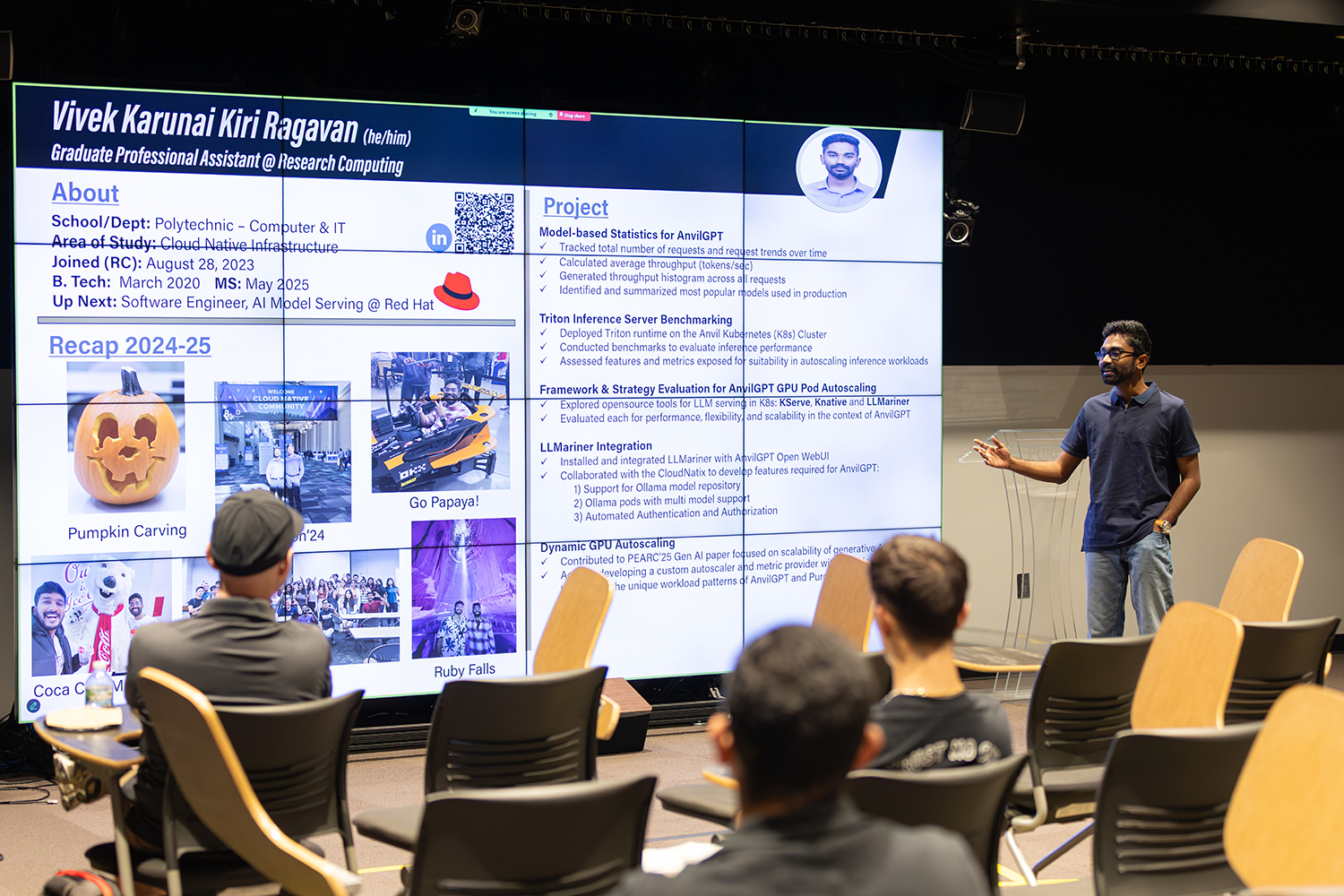
RCAC student improves Anvil supercomputer while obtaining Master’s degree
Vivek Karunai Kiri Ragavan, a Graduate Research Assistant at the Rosen Center for Advanced Computing (RCAC), recently obtained his Master of Science (MS) degree in Computer Information and Technology. His MS thesis was related to the work he conducted at RCAC, which focused on enhancing cloud-native...
-

Purdue receives $4 million NSF grant for StreamCI data streaming platform
Purdue University’s Rosen Center for Advanced Computing (RCAC) is leading a major National Science Foundation (NSF) grant awarded to create an artificial intelligence (AI)-ready streaming data platform for researchers across domains. This new platform, known as StreamCI, will significantly lower tec...
-

Anvil used to advance research on two-phase flows
Researchers from The George Washington University used Purdue’s Anvil supercomputer to simulate fluid flows in order to elucidate the physics of turbulent bubble entrainment. Understanding this process will lead to practical applications in a variety of fields, including oceanography, naval engineer...
-

CI-XP Student Presentations at the Envision Center
The Rosen Center for Advanced Computing (RCAC) recently hosted its annual CI-XP Student Program Lightning Talks, giving RCAC students a chance to showcase their projects and accomplishments to peers and staff within the organization. The CI-XP (Cyber Infrastructure-eXPerience) Student Program provid...
-
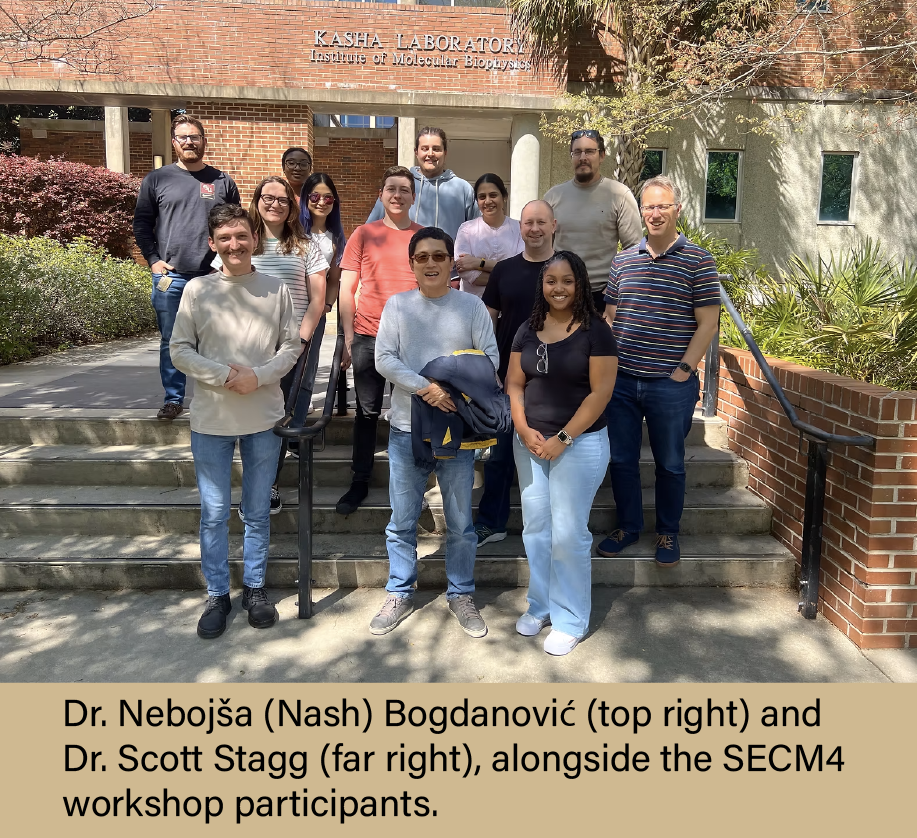
Anvil supercomputer supports Cryo-EM workshop
The Southeastern Center for Microscopy of Macromolecular Machines (SECM4) utilized Purdue University’s Anvil supercomputer to host the 2024 SECM4 data processing workshop. The workshop focused on teaching researchers how to process data for single-particle cryogenic electron microscopy (SPA-cryo-EM)...
-
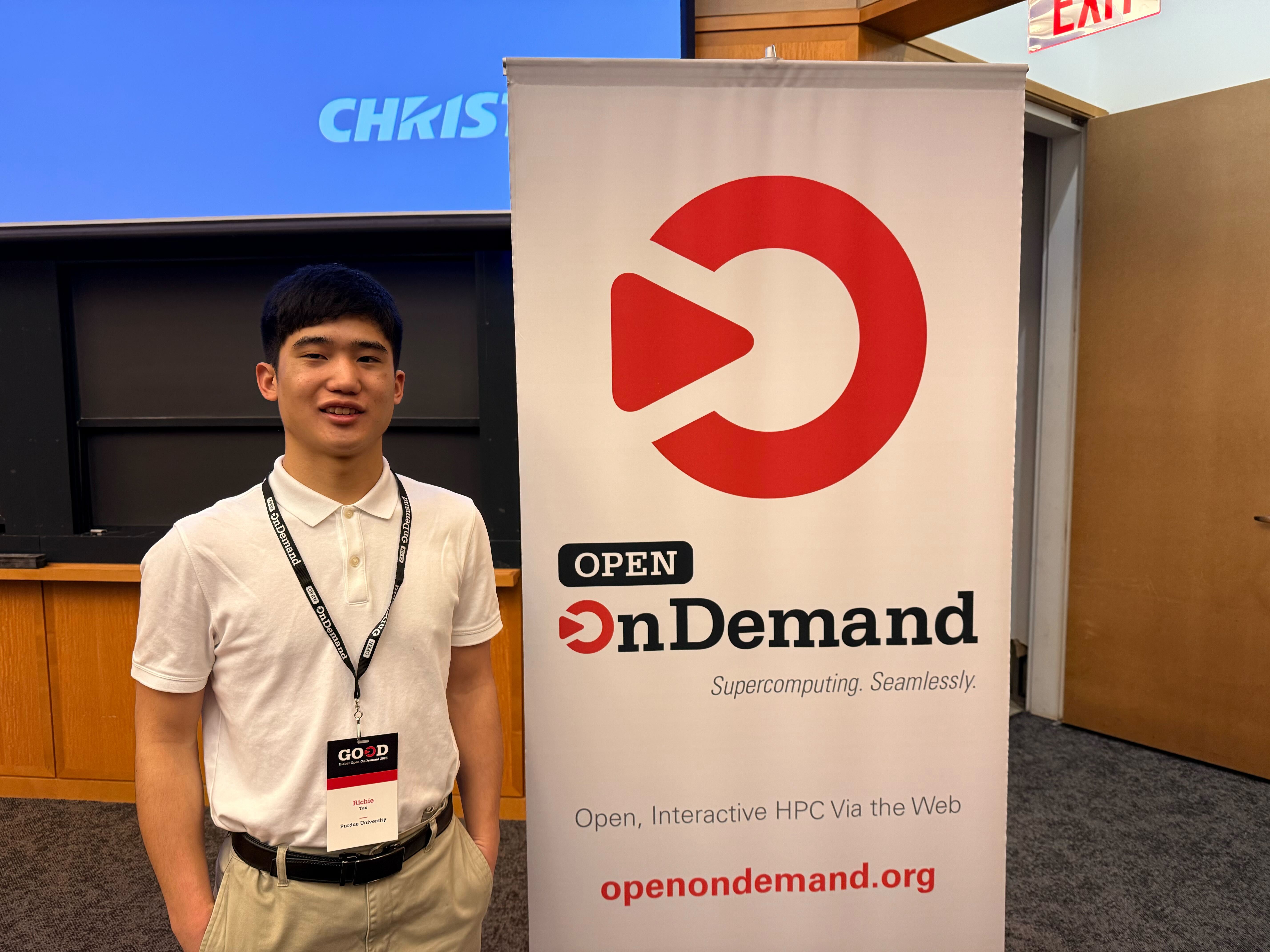
Anvil REU Student presents at GOOD 2025
Richie Tan, one of the participants of the Rosen Center for Advanced Computing’s (RCAC) 2024 Anvil Research Experience for Undergraduates (REU) Summer program, recently presented at the Global Open OnDemand 2025 Conference (GOOD 2025). Tan highlighted the web dashboard that he and another REU studen...
-
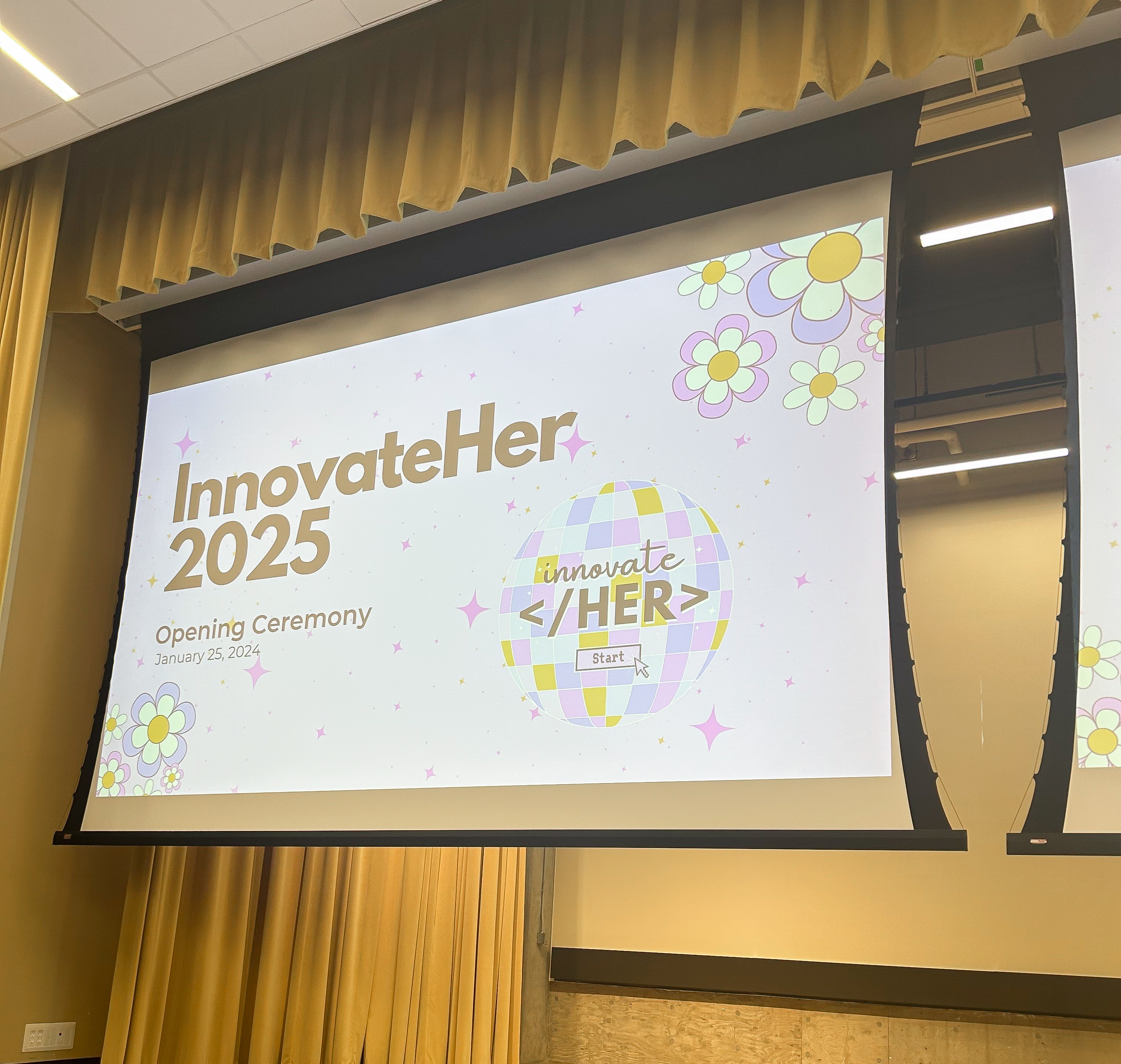
RCAC sponsors two successful hackathons
The Rosen Center for Advanced Computing (RCAC) has had a busy start to the new year. From delivering top-notch HPC (high-performance computing) training events, giving presentations at different campuses and national meetings, and hosting demonstrations of our newest technologies, the staff at RCAC...
-
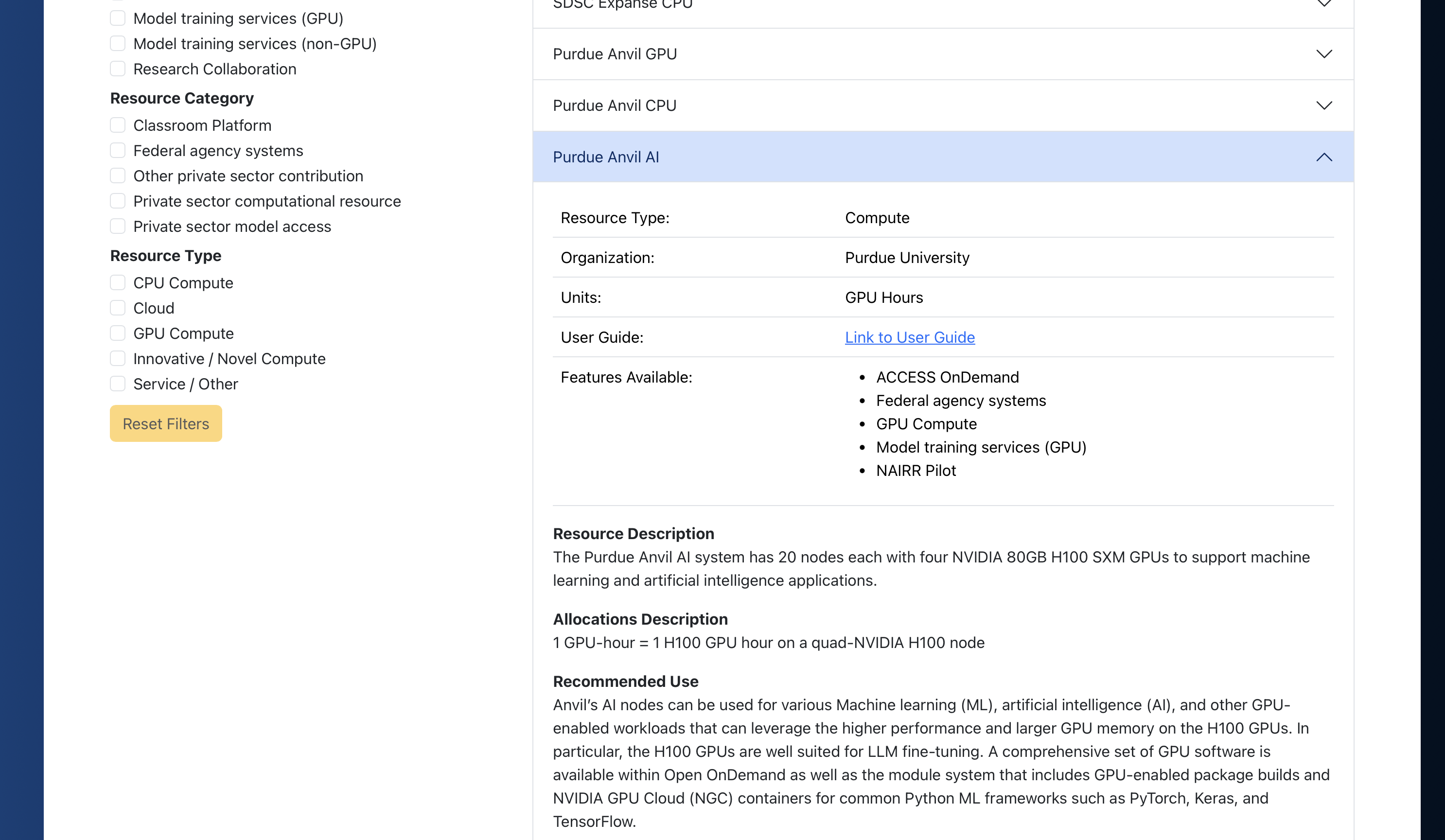
Anvil AI now available for allocations through NAIRR
Researchers nationwide can now request access to the Rosen Center for Advanced Computing’s (RCAC) new national artificial intelligence (AI) resource, Anvil AI. Purdue University's powerful national HPC-resource, the Anvil supercomputer, recently received an upgrade, thanks to support from the Nation...
-

Researcher uses Anvil to improve wind farm power prediction
A researcher from the Massachusetts Institute of Technology (MIT) used Purdue’s Anvil supercomputer to help create more accurate Numerical Weather Prediction (NWP) models for offshore wind farms. Better model predictions can lead to a slew of benefits, such as determining ideal site selection and op...
-

RCAC to be official sponsor of BoilerMake XII
The Rosen Center for Advanced Computing (RCAC) is excited to announce their role as an official sponsor of the upcoming BoilerMake XII. BoilerMake is Purdue University’s premier hackathon, inviting undergraduate students from across the nation to join together for a weekend of computational and tech...
-
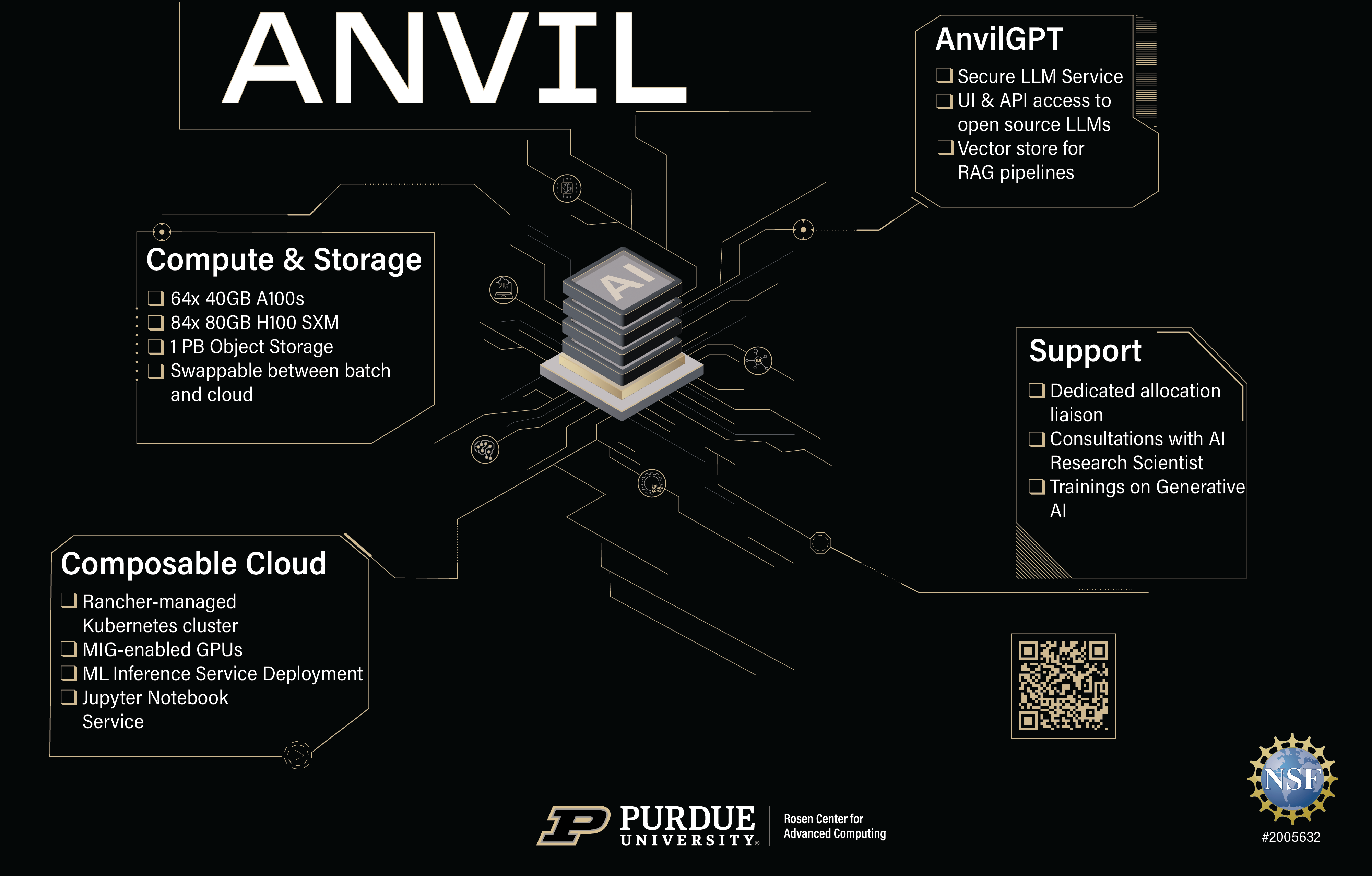
Purdue University’s powerful supercomputer, Anvil, recently received a major upgrade, thanks to funding provided by the National Science Foundation’s (NSF) NAIRR Pilot Program. The new expansion has been installed and is now ready for use. With this Anvil upgrade, Purdue now offers a national superc...
-
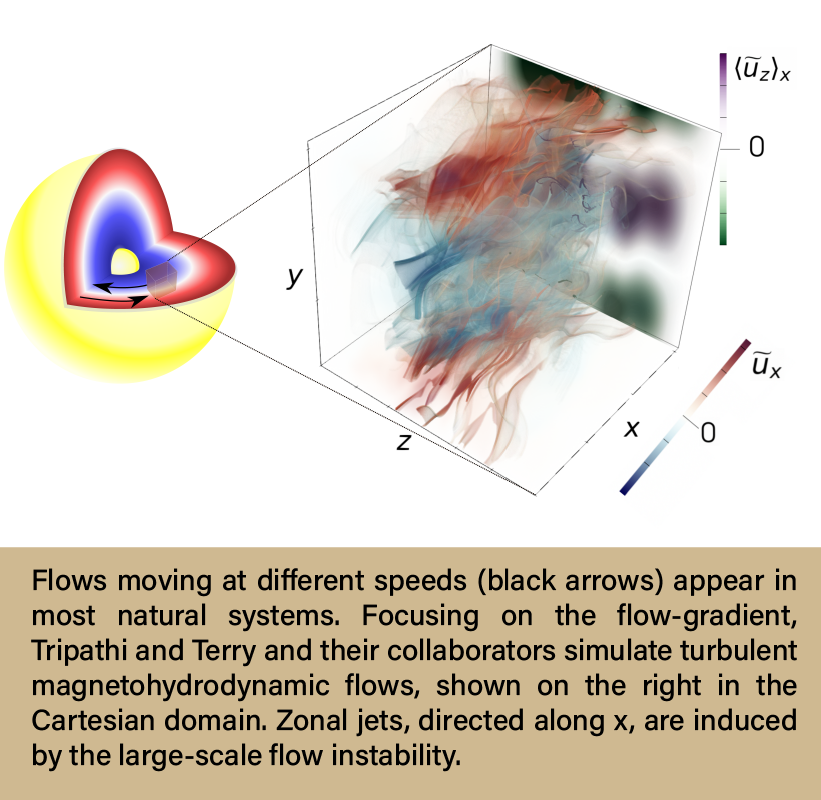
Researchers from the University of Wisconsin (UW)–Madison used Purdue’s Anvil supercomputer to study turbulence and turbulent transport in astrophysical plasmas. This research seeks to elucidate the fundamental physics of turbulence, which will have applications across the fields of fluid and plasma...
-
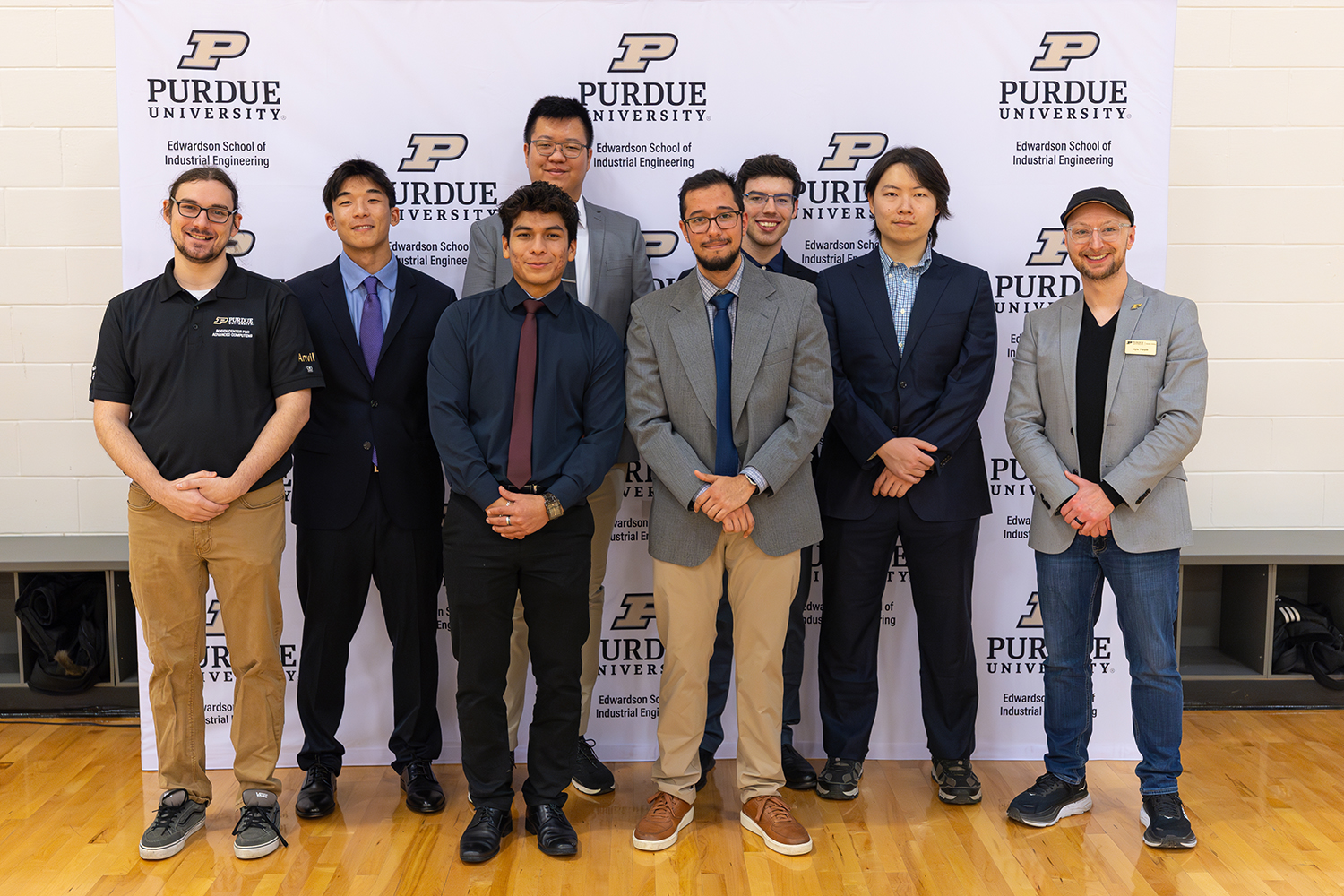
Industrial Engineering students present their RCAC Capstone Project
Six students from the Edwardson School of Industrial Engineering recently completed their senior capstone project, which focused on helping to predict and reduce downtimes for RCAC’s computing systems. The group worked toward creating a predictive-maintenance Artificial Intelligence (AI) tool for mo...
-
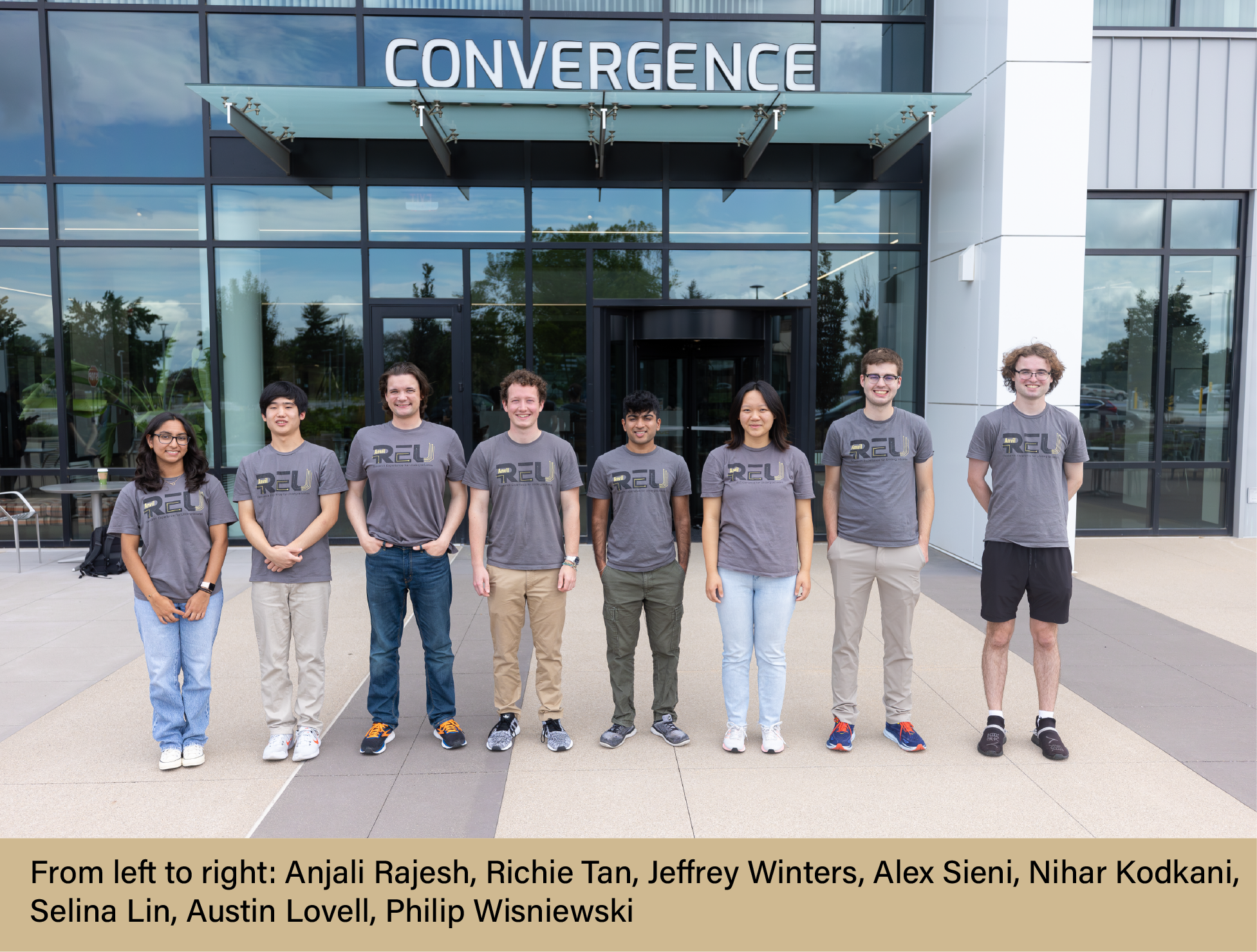
RCAC successfully hosts third Anvil REU Summer program
Over the summer, the Rosen Center for Advanced Computing (RCAC) hosted its third annual 11-week hands-on internship, the Anvil Research Experience for Undergraduates (REU) Summer 2024 program. Eight students from across the nation gathered at Purdue’s campus in West Lafayette, Indiana, for this year...
-
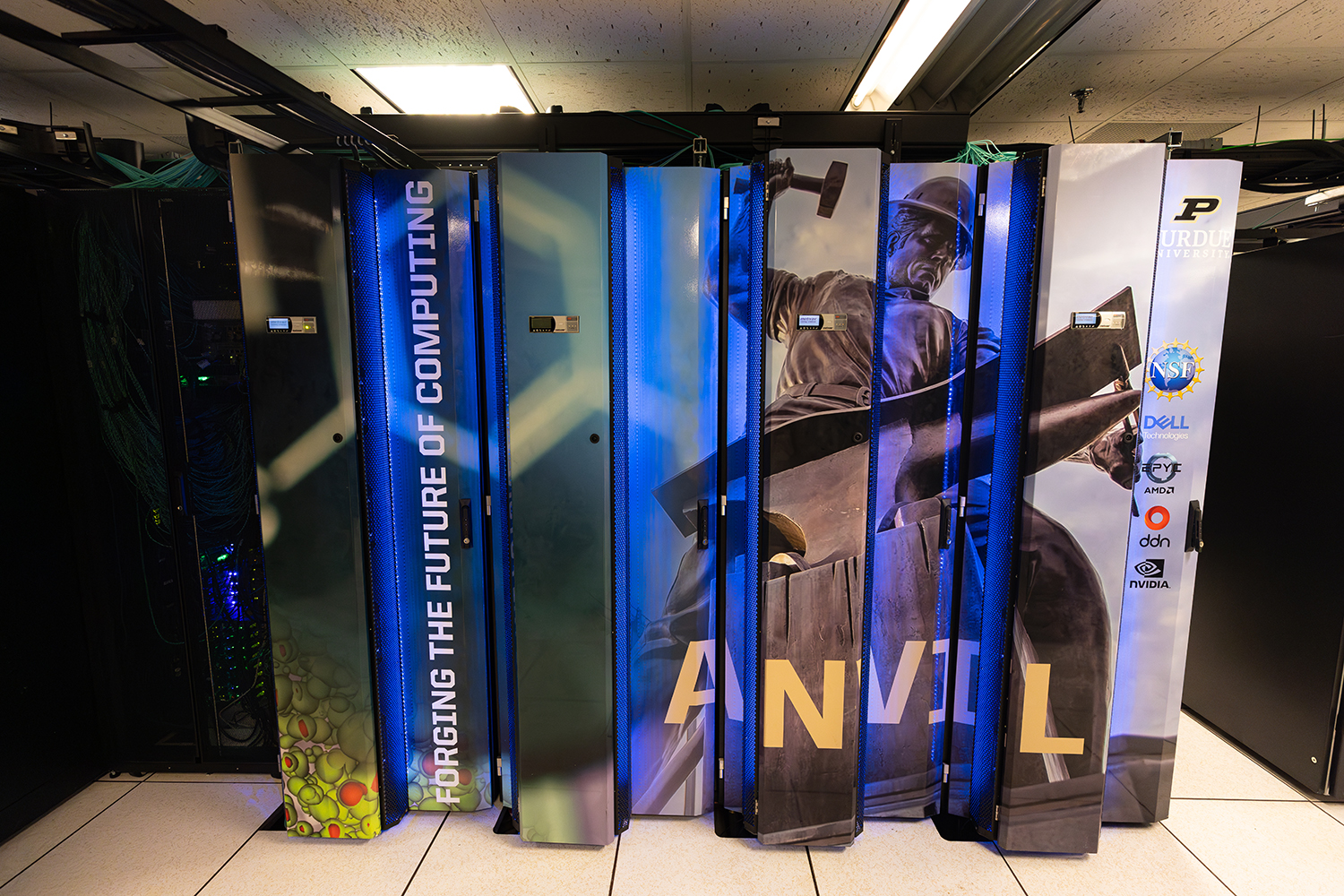
NAIRR Pilot proves to be successful in delivering resources to AI researchers
Earlier this year, the National Science Foundation (NSF) launched the National Artificial Intelligence Research Resource (NAIRR) Pilot to demonstrate the NAIRR concept and advance its primary goals of spurring innovation, increasing diversity of talent, improving capacity, and advancing safe, secure...
-
High school student learns HPC with Anvil
Last Spring, under the guidance of PhD student Anastasia Neuman, a high schooler completed her senior capstone project by conducting research utilizing Purdue University’s Anvil supercomputer. The pair used Anvil to run simulations elucidating the thermodynamics of nanocomposites. Sarah Will recentl...
-

RCAC receives NASA grant to elucidate the effects of wildfires on water systems
Purdue University’s Rosen Center for Advanced Computing (RCAC) is part of a major NASA grant awarded to develop a new Cyberinfrastructure (CI) tool for post-fire water management and decision-making. This tool, named HydroFlame, will allow researchers to predict the amount of damage wildfires will c...
-
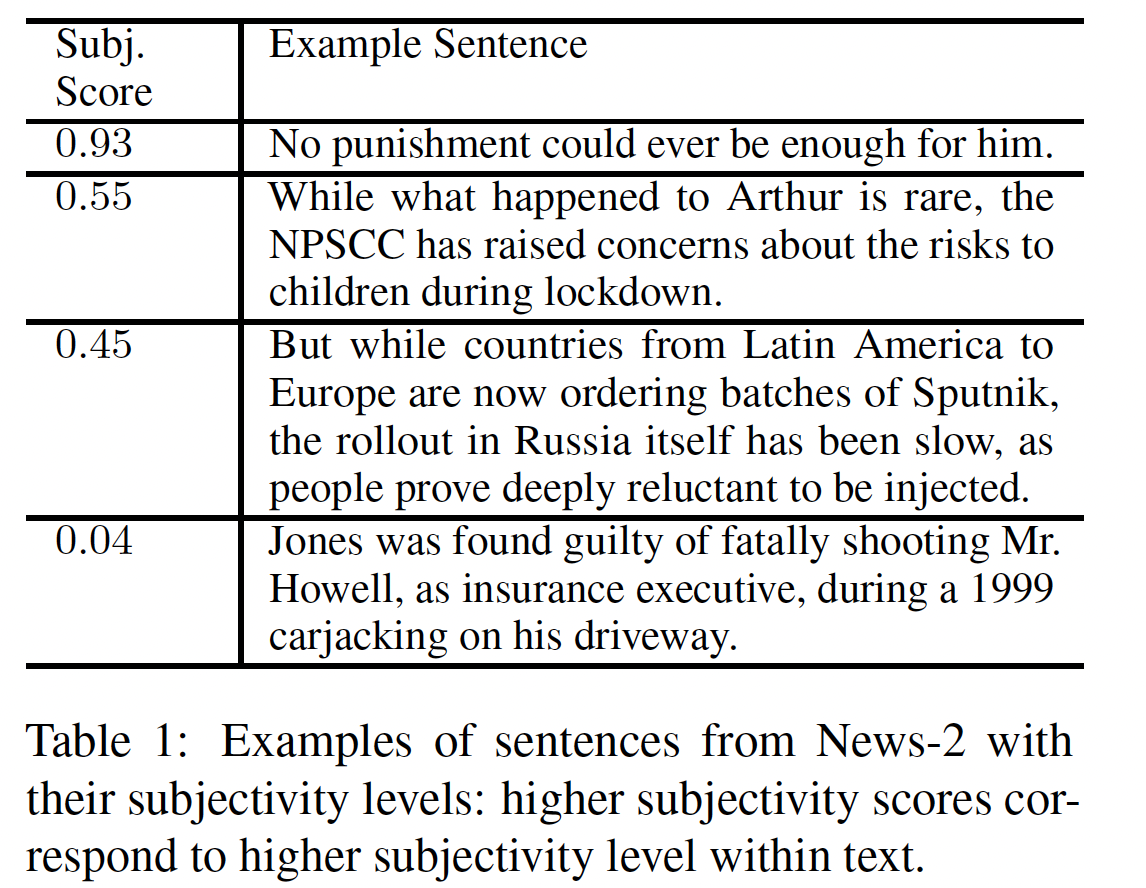
Researchers use Anvil supercomputer to help detect manipulation in media
In our world of 24-hour news cycles and social media reporting, the amount of information we receive daily has reached astounding levels. Never before has information exchange flowed so freely, nor so quickly, with news from anywhere in the world available instantly at our fingertips. We are dominat...
-
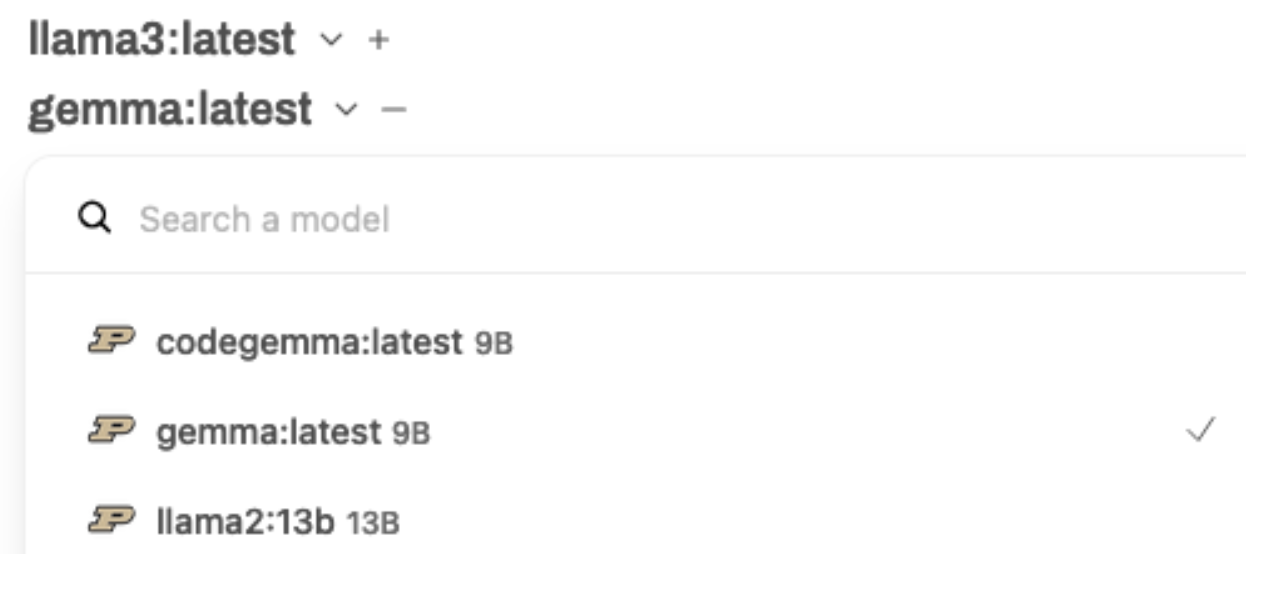
Introducing AnvilGPT: Anvil’s powerful new LLM service for researchers
Purdue University’s Anvil supercomputer now offers a powerful new feature in its artificial intelligence software services—AnvilGPT. AnvilGPT is a large language model (LLM) service that makes open-source LLM models like LLaMA accessible worldwide to ACCESS researchers. Unlike other LLM services, An...
-
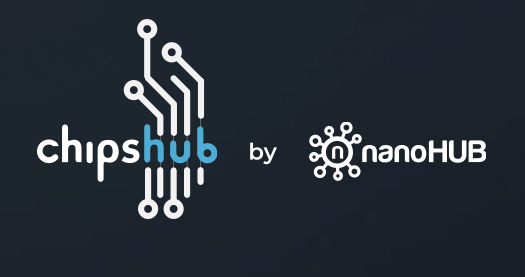
Chipshub and Anvil union is a proven success for semiconductor workforce development
Chipshub, the online platform for everything semiconductors, has finally arrived. After a massive development effort from the nanoHUB team, and with help from the staff at the Rosen Center for Advanced Computing (RCAC), the online platform delivered advanced simulation software to the Purdue Summer...
-
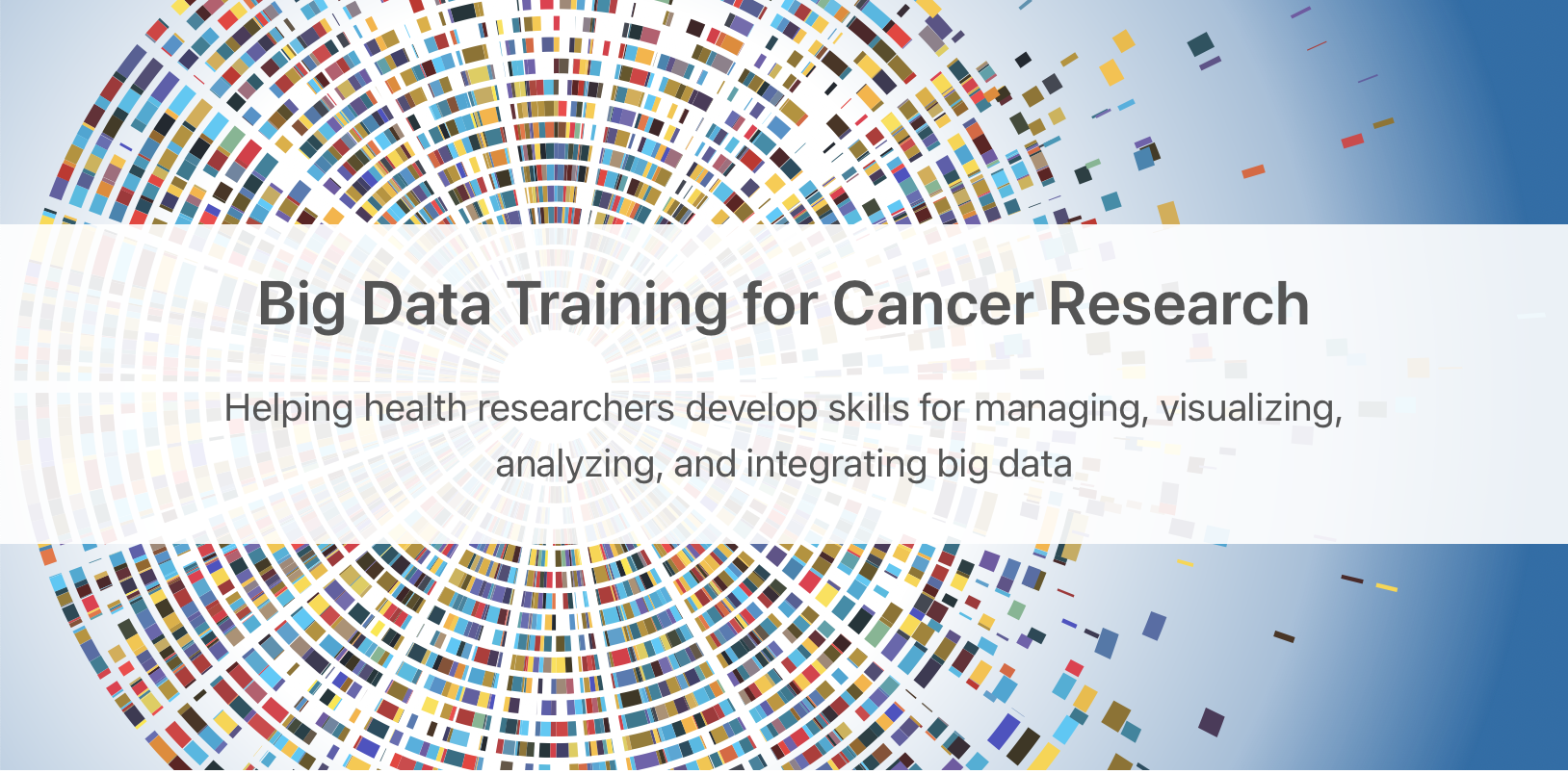
Anvil supports BigCARE 2024 Summer Workshop
Purdue University’s Anvil supercomputer recently supported the 2024 BigCARE Summer Workshop, which took place at the University of California, Irvine (UCI). The workshop was a two-week intensive class aimed at helping cancer researchers develop skills for managing, visualizing, analyzing, and integr...
-
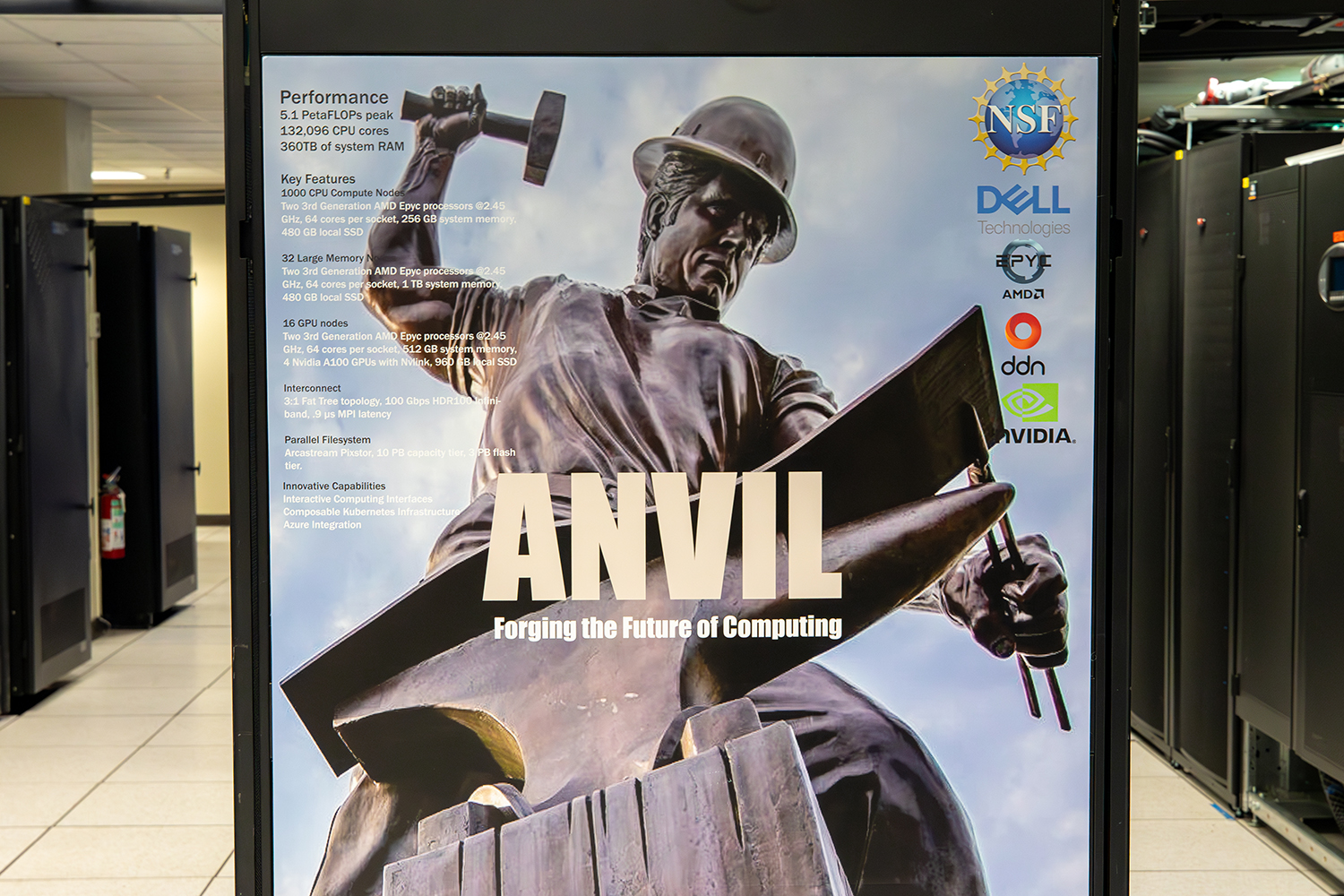
Purdue University receives $4.9 million NSF award to enhance Anvil to support AI research
The National Science Foundation (NSF) has recently awarded a $4.9 million supplement for Anvil, Purdue University’s most powerful supercomputer. This funding has been given in part to support the newly launched National Artificial Intelligence Research Resource (NAIRR) Pilot. This NSF supplement wil...
-
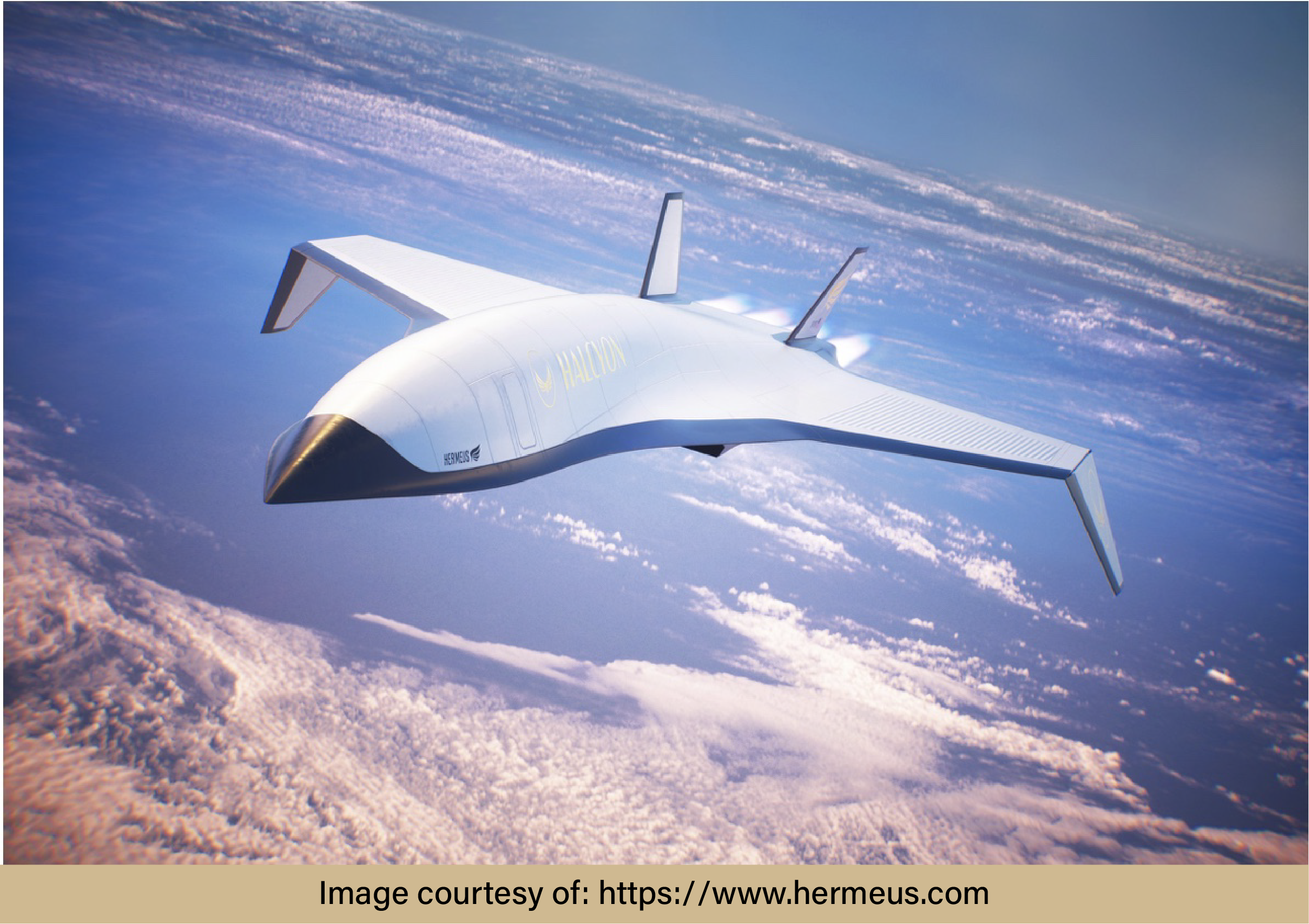
Anvil helps researchers study particle dynamics for hypersonic vehicles
Hypersonic flight—that is, flying faster than Mach 5, or five times the speed of sound—has been around longer than you may think. The first object of human origin to achieve hypersonic flight dates back to 1949 when the U.S. Army test-fired a multi-stage rocket. Fast-forward to today, and we now hav...
-

Anvil to support upcoming BigCARE 2024 Summer Workshop
The 2024 BigCARE Summer Workshop is soon to commence at the University of California, Irvine (UCI). This year will be UCI’s first time hosting the summer workshop, with the university opening its doors from July 14-26 for all cancer researchers to come and learn. The two-week intensive workshop aims...
-
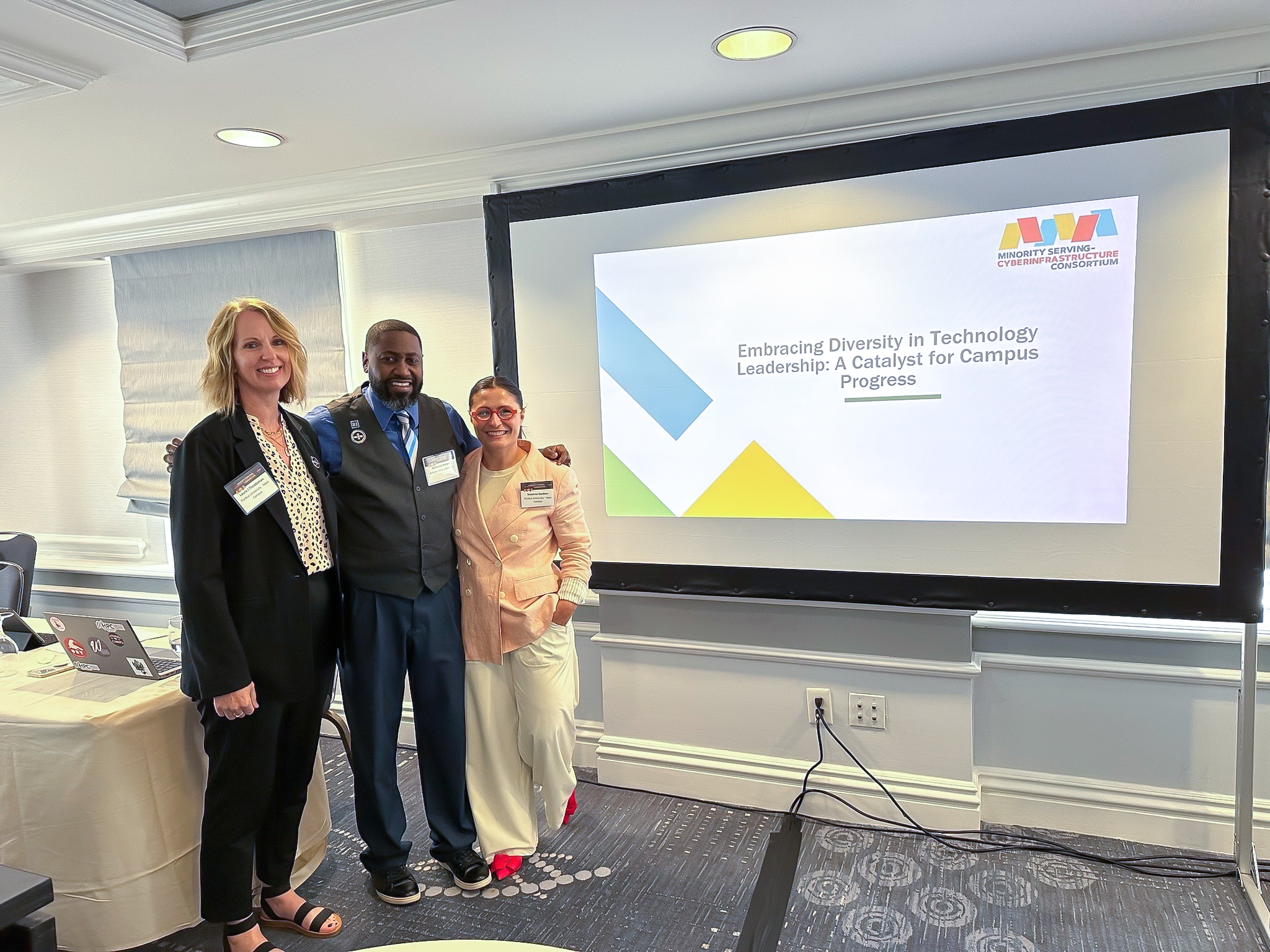
RCAC participates in the Minority Serving – Cyberinfrastructure Consortium annual meeting
Suzanna Gardner, Senior Research Operations Administrator of Outreach and Engagement for the Anvil supercomputer at RCAC, and Laura Theademan, Director of Center Operations and Visualization at RCAC, recently presented at the 2024 Minority Serving – Cyberinfrastructure Consortium (MS-CC) Annual Meet...
-
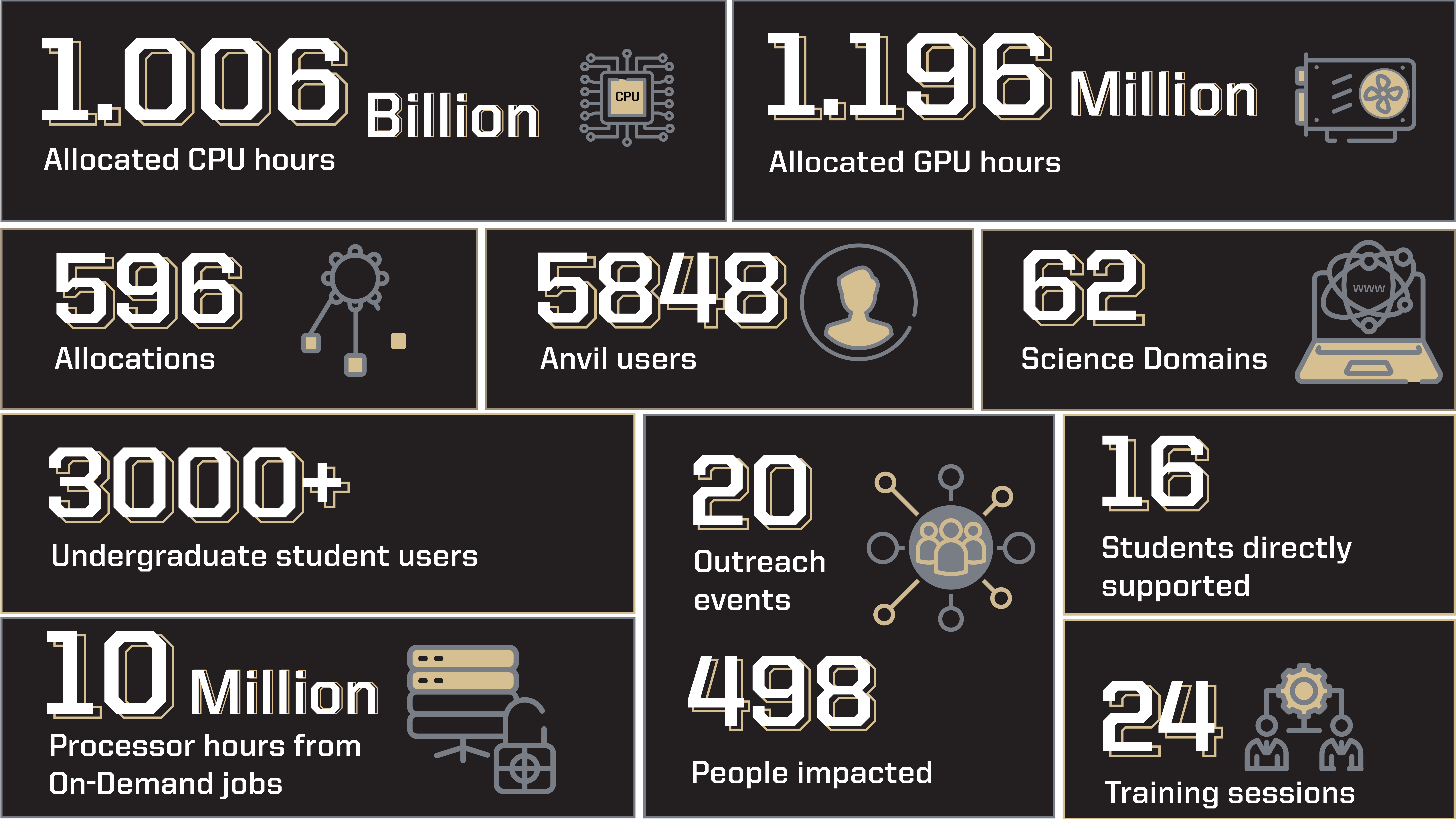
Anvil enters year three of production
Anvil, Purdue’s most powerful supercomputer, continues its pursuit of excellence in HPC as it enters its third year of operations. Funded by a $10 million acquisition grant from the National Science Foundation (NSF), Anvil began early user operations in November 2021 and entered production operation...
-
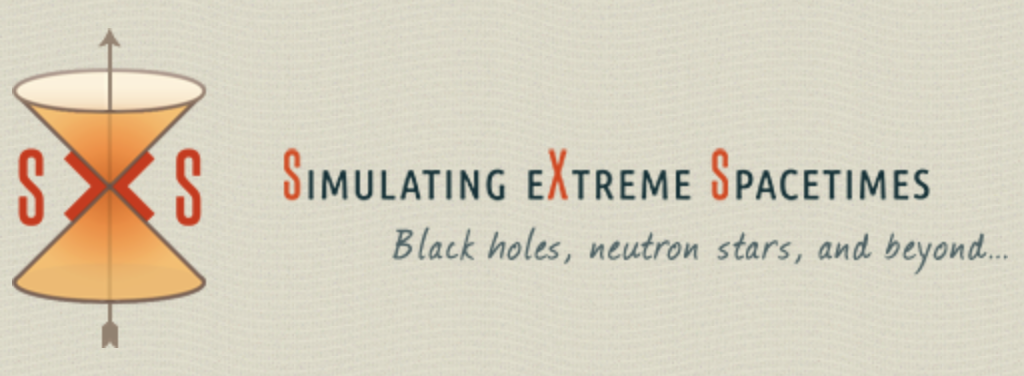
Anvil helps researchers simulate and predict gravitational waves
Scientists from the collaborative Simulating eXtreme Spacetimes (SXS) research group are using Purdue’s Anvil supercomputer to explore the physics of cataclysmic space-time events and help shed light on the nature of one of the Universe’s fundamental forces: gravity. Vijay Varma, Assistant Professor...
-
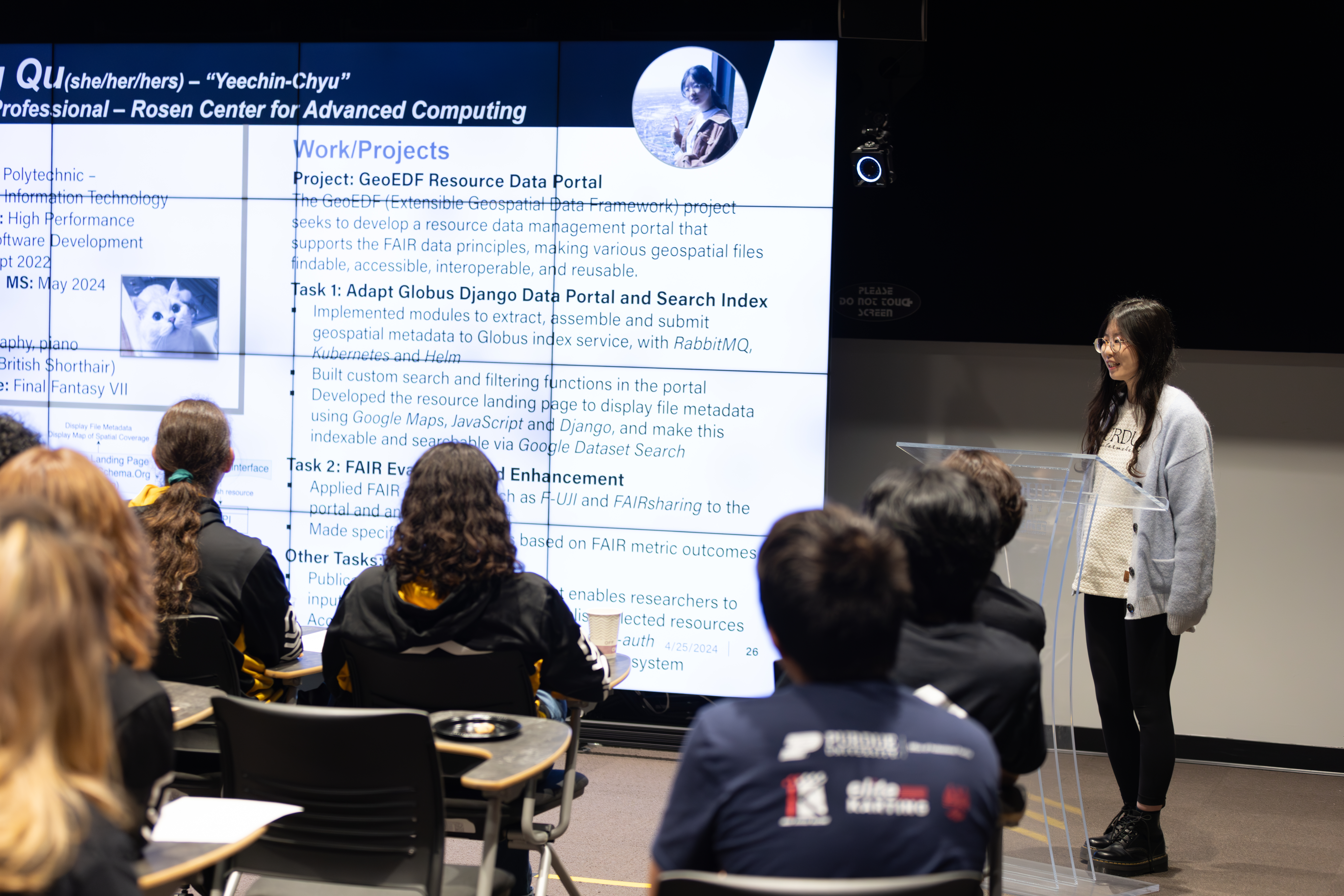
RCAC student employee successfully defends Master’s Thesis
Yiqing Qu, a Graduate Research Assistant at the Rosen Center for Advanced Computing (RCAC), recently obtained her Master of Science (MS) degree in Computer Information and Technology. Her MS thesis was related to the work she conducted at RCAC, which ensured that there is a way to measure and improv...
-
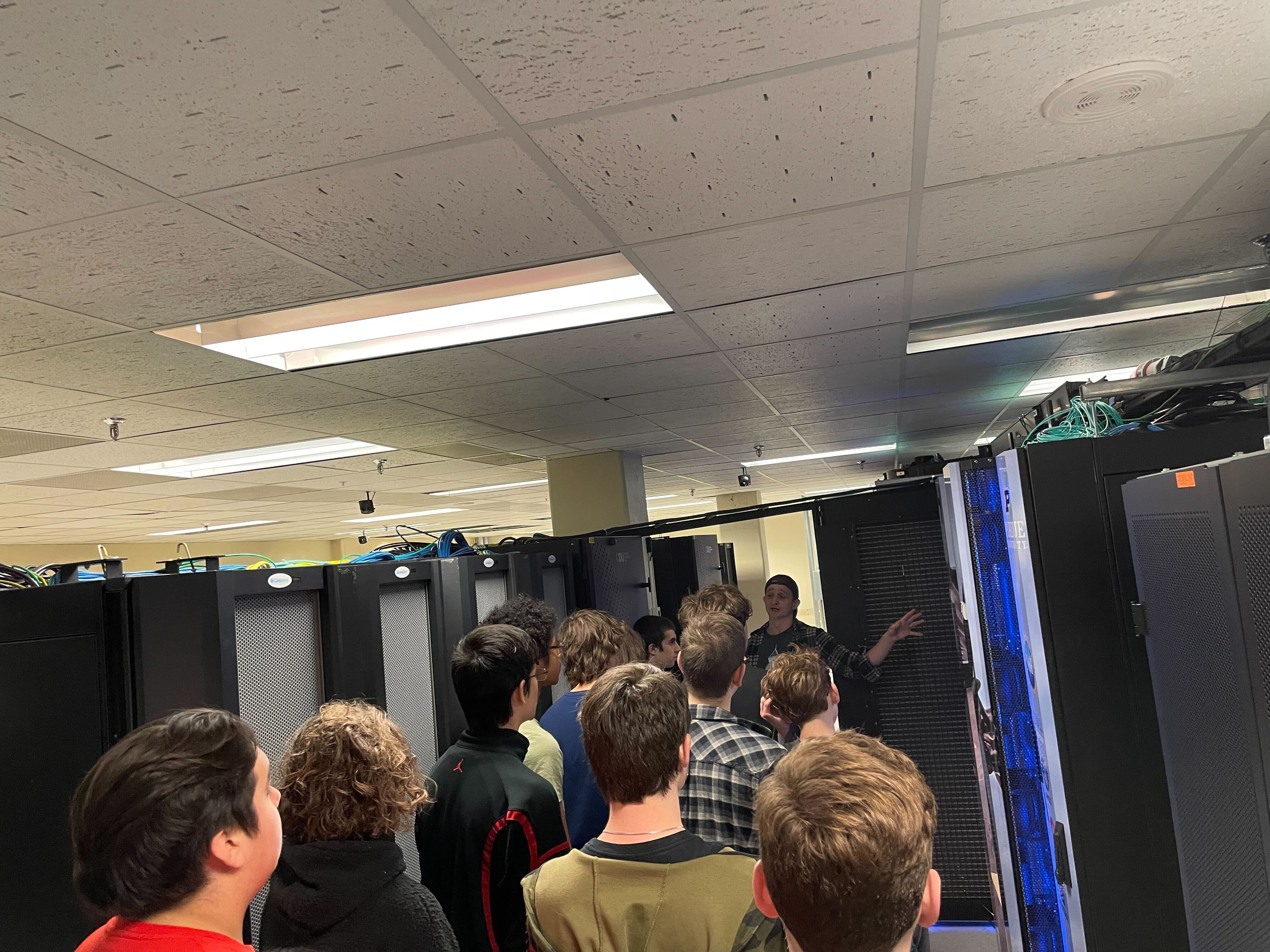
RCAC hosts outreach event for local high schoolers
The Rosen Center for Advanced Computing (RCAC) recently hosted an outreach activity for the Southport High School Engineering, Computer Science, and Robotics students and the school’s Girls Who Code group. During the event, the high schoolers learned about the Anvil supercomputer as well as RCAC’s E...
-

Anvil supercomputer slated to assist with national pilot project aimed at advancing AI
Purdue University’s Anvil supercomputer is now an official resource provider for the newly launched National Artificial Intelligence Research Resource (NAIRR) Pilot. The NAIRR is a National Science Foundation (NSF) project aimed at creating a national infrastructure that connects U.S. researchers to...
-
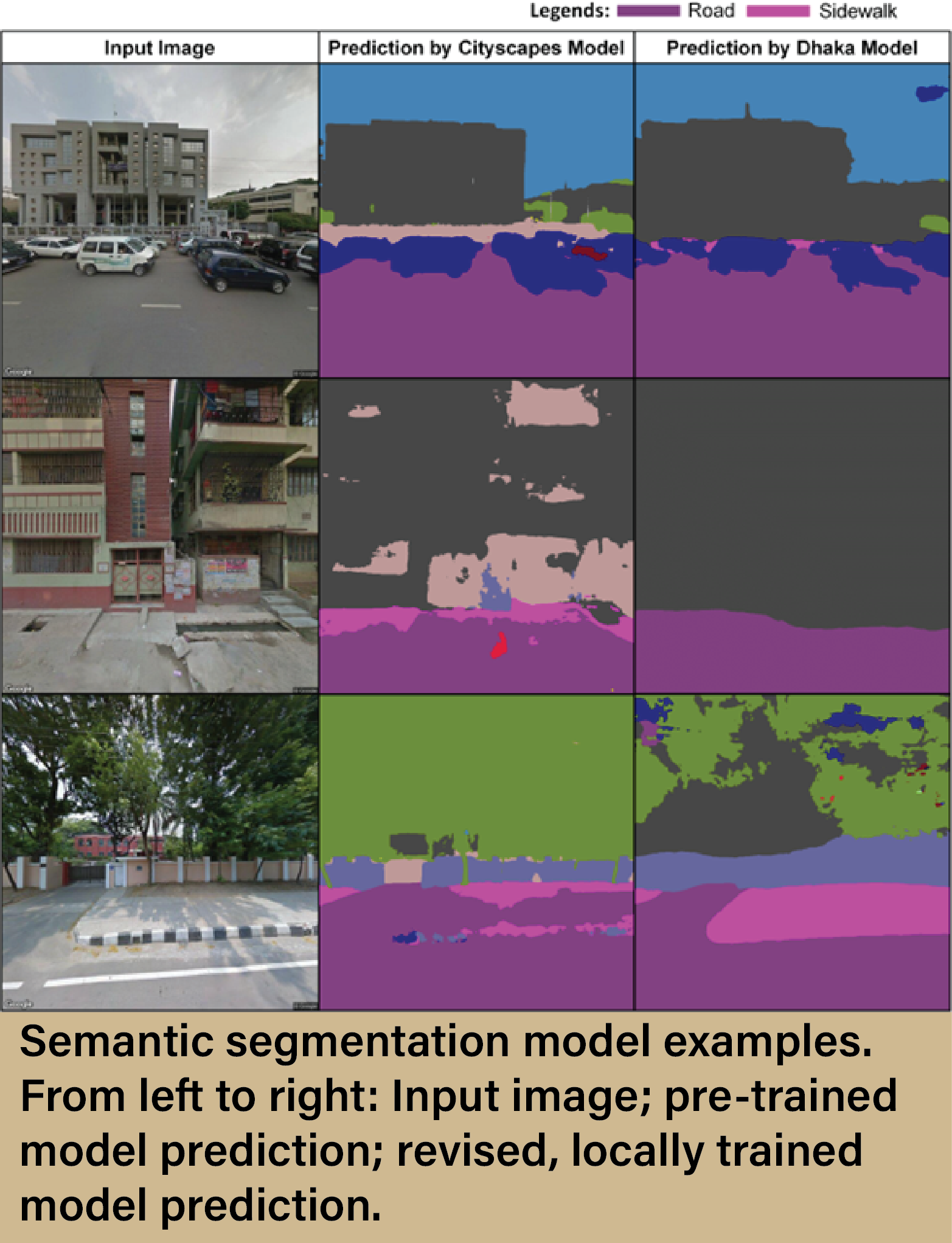
Anvil assists in AI research to help boost pedestrian infrastructure
Researchers from Purdue University used the Anvil supercomputer in their quest to automate sidewalk identification from Google Street View images and develop sidewalk maps for neighborhoods using computer vision techniques. Omar Faruqe Hamim is a Graduate Research Assistant at the Lyles School of Ci...
-
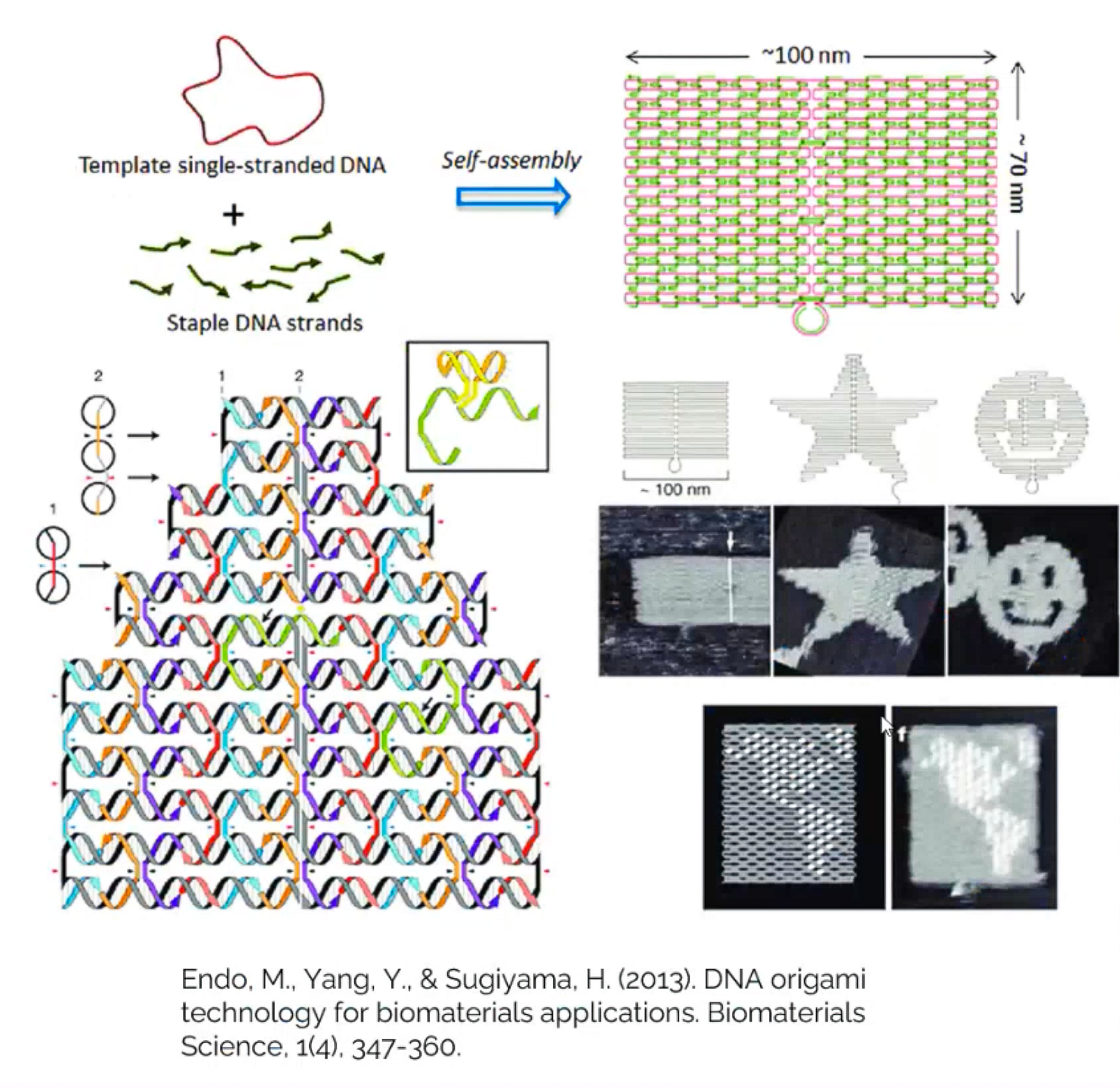
Anvil supercomputer used to advance knowledge of nanotechnology
A researcher from Duke University is using Purdue’s Anvil supercomputer to study and explore the underlying physics of a nanotechnology known as DNA Origami. Pranav Sharma is an Associate Researcher in the Biological and Soft Materials Modeling Lab at Duke University. He is using Anvil to develop an...
-

RCAC and Purdue’s Women in HPC assist with inaugural InnovateHer Hackathon
The Rosen Center for Advanced Computing (RCAC) and Purdue’s Women in High-Performance Computing (WHPC) group recently participated in the inaugural InnovateHer Hackathon, a weekend-long event at Purdue University aimed at fostering inclusivity in the field of technology. InnovateHer was a 36-hour lo...
-
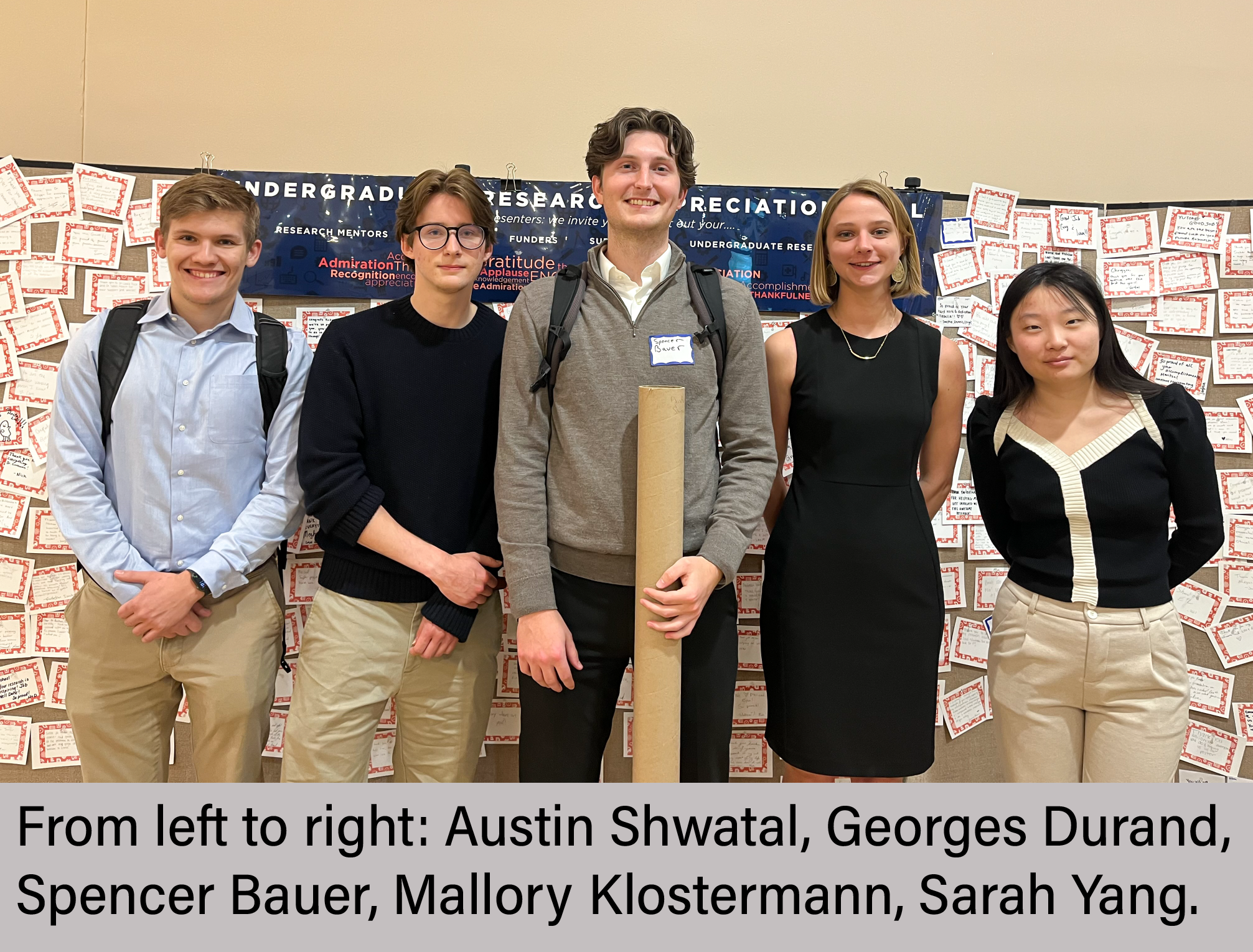
Anvil helps undergraduates gain real-world HPC experience
Five students from the University of Illinois Urbana-Champaign (U of I) took part in a semester-long research experience program to gain practical knowledge on data analytics and statistical research using common computing HPC resources. Daniel Ries, a Principal Data Scientist at Sandia National Lab...
-
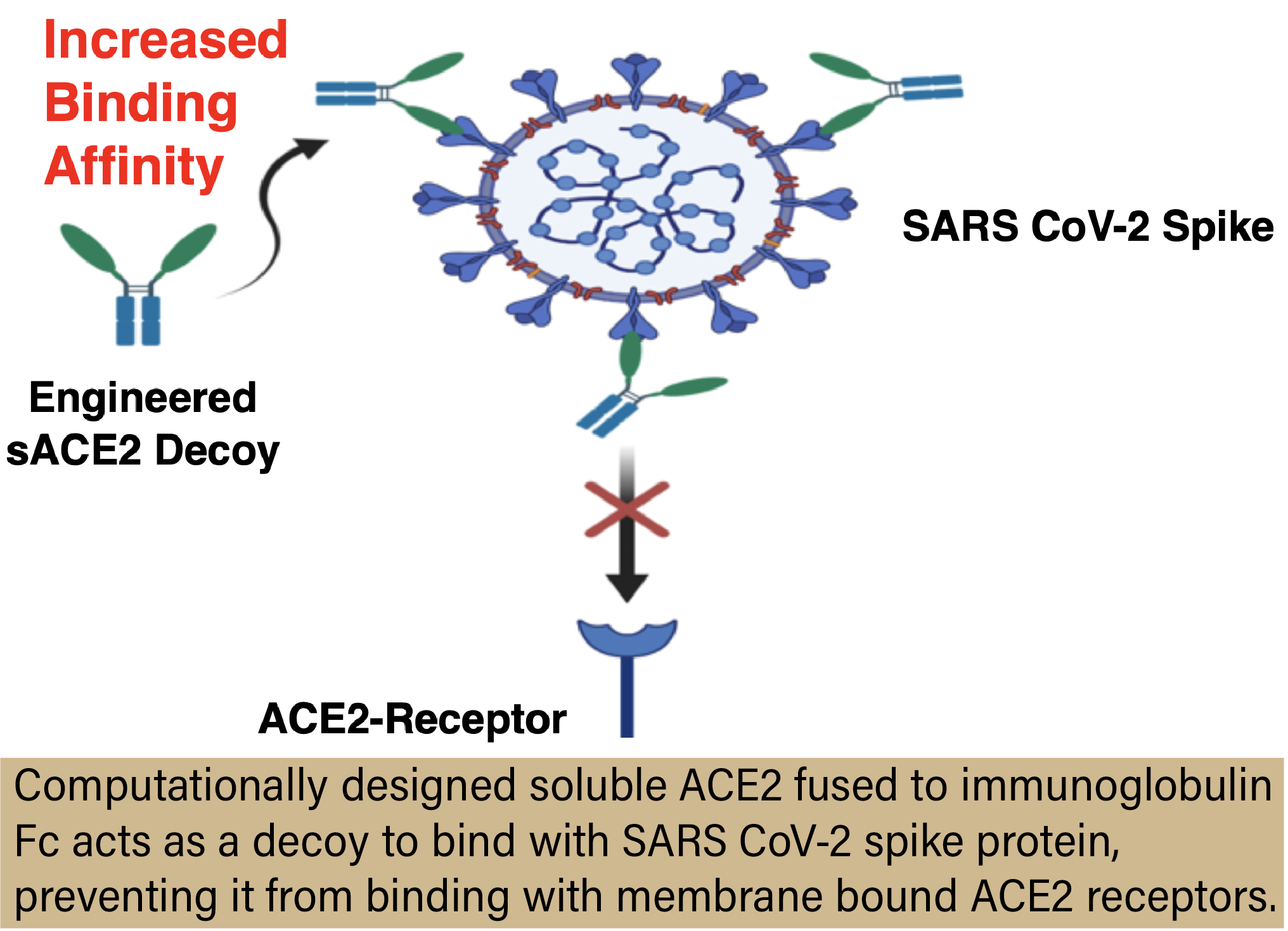
Anvil helps develop new SARS-CoV-2 therapy
A research team from Delaware State University used Purdue’s Anvil supercomputer to computationally design a new pan-coronavirus therapy that is resistant to mutational changes. Dr. Mohammad Shahidul Islam, a former assistant professor in the Department of Chemistry at the University of Illinois Chi...
-
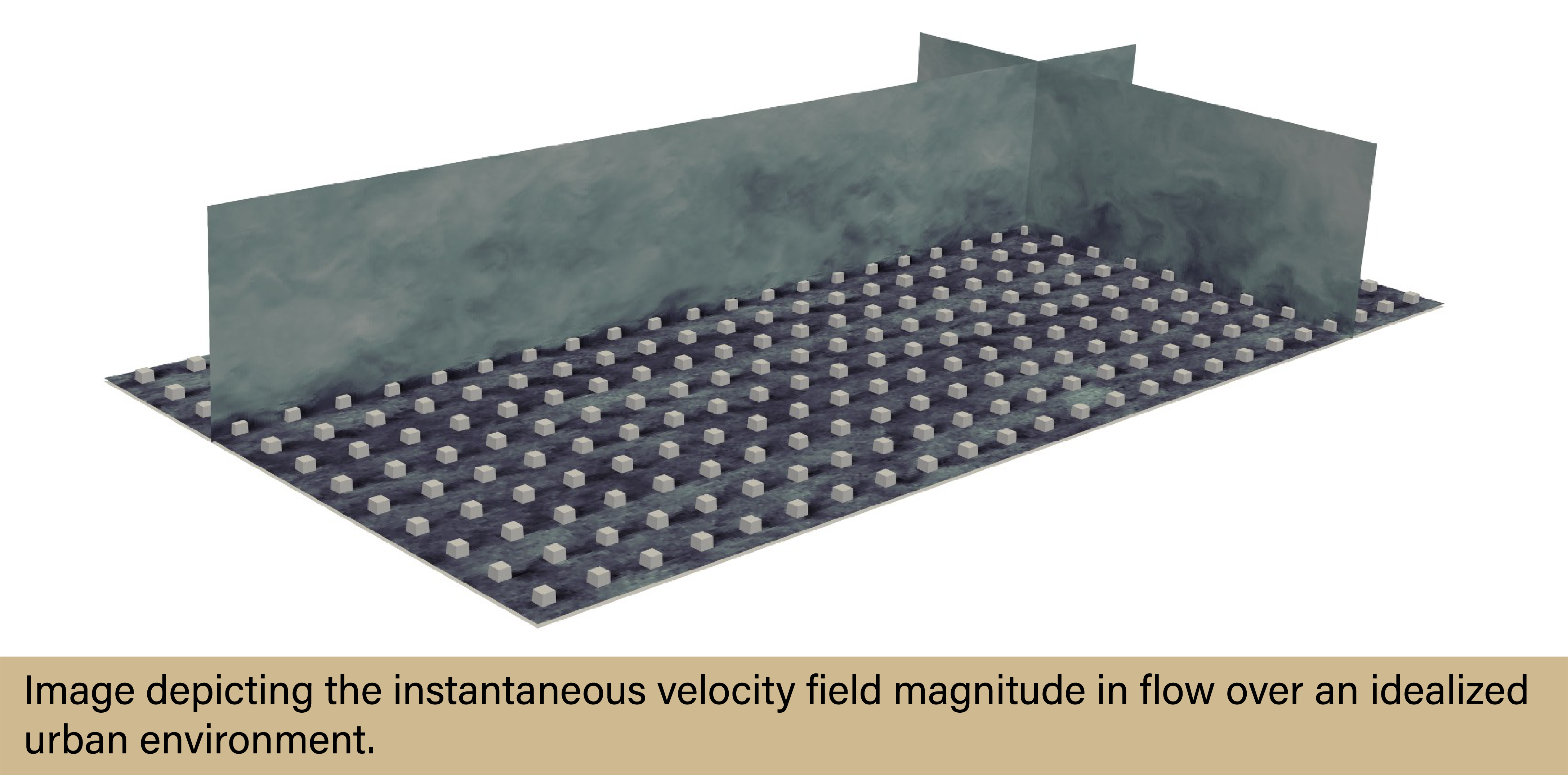
Anvil helps researchers study land-atmosphere interaction processes
A research group from Columbia University has utilized Purdue’s Anvil supercomputer to run computational fluid dynamics simulations in order to learn more about atmospheric turbulence and the interactions between land surfaces and the atmosphere. Dr. Marco Giometto is an Assistant Professor in the C...
-

Competitors on the court, colleagues in computing
High-performance computing (HPC) is booming in the state of Indiana. Two of the nation’s top National Science Foundation (NSF)-funded supercomputers reside on campuses within the state: Purdue University’s Anvil supercomputer, located in West Lafayette, and Indiana University’s (IU) Jetstream2 syste...
-
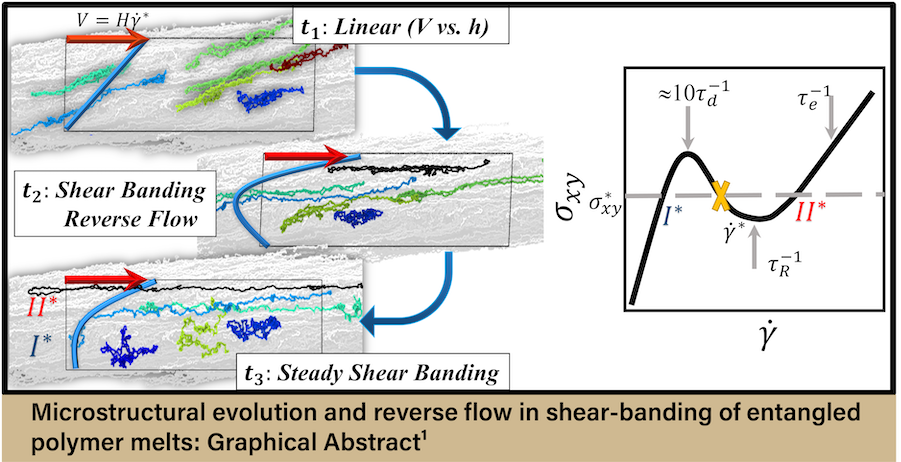
Researchers use Anvil supercomputer to study instabilities in polymers
Scientists from the Material Research and Innovation Laboratory (MRAIL) at the University of Tennessee-Knoxville used the Anvil supercomputer to obtain a deeper understanding of the Flow-induced structural instabilities of polymers and polymer dynamics. Dr. Mahdi Boudaghi, Dr. Brian Edwards, and Dr....
-

Exploratory Series: Archaeology and HPC
Running from boulders, jumping across chasms, defeating villains while simultaneously finding ancient and mysterious artifacts—this is archaeology. Except, that’s not quite true. These are common misconceptions people tend to have about the field, and they can drive any hard-working archaeologist in...
-
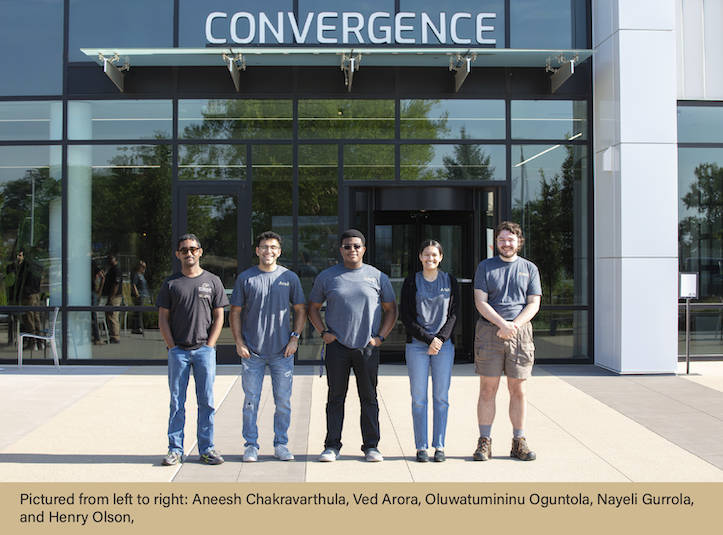
Anvil REU Summer 2023 program is a tremendous success
After 11 weeks of hard work and hands-on education, the Anvil Research Experience for Undergraduates (REU) Summer 2023 program has come to a close. This year’s Anvil REU program saw five students from across the nation gather at Purdue’s campus in West Lafayette, Indiana, to learn about high-perform...
-
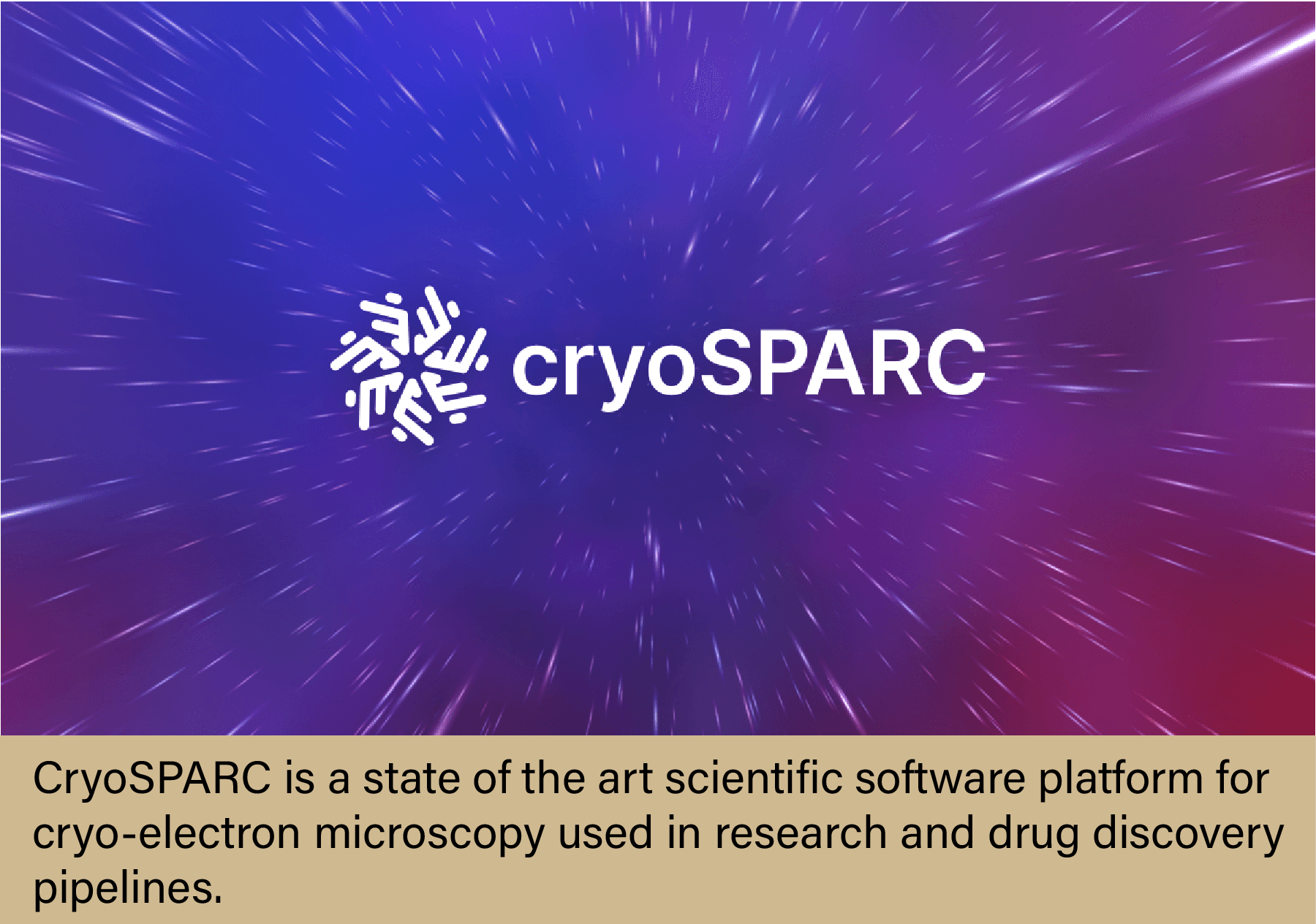
Introducing CryoSPARC: Anvil’s powerful new software aimed at bioscience research
The Anvil supercomputer has recently received a full integration of CryoSPARC, a state-of-the-art HPC software solution designed to enable the complete processing of single-particle cryo-electron microscopy (cryo-EM) data. With this new addition to an already extensive software catalog, Anvil is no...
-
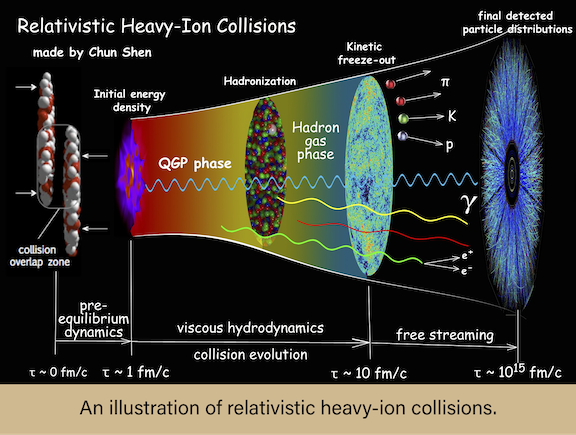
Purdue’s Anvil supercomputer helps researchers look at the origins of the universe
A long time ago, before there were galaxies far, far away, there was an explosion of unimaginable proportions. Everything that ever has and ever will exist in the universe was compressed within a single point, and for reasons unknown, that point exploded—an event called the Big Bang—creating matter...
-
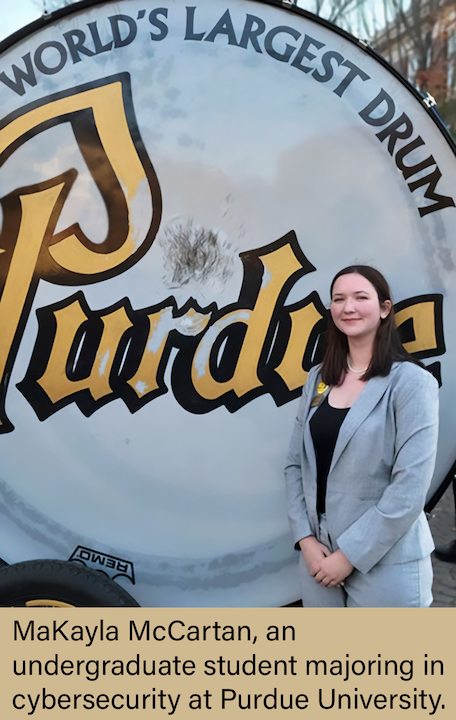
Anvil REU Student Lands Cybersecurity Role
MaKayla McCartan is an undergraduate student at Purdue University, where she majors in cybersecurity and minors in both sociology and organizational leadership. McCartan was a participant in the 2022 Anvil REU program, and has recently accepted an internship at Grant Thornton, a globally known tax,...
-
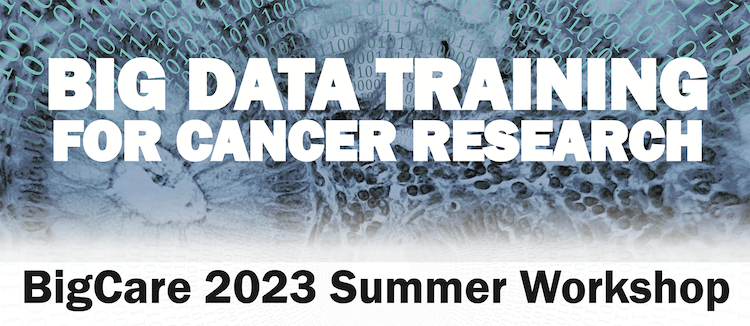
Cancer researchers learn about big data analysis using Anvil
The BigCare 2023 Summer Workshop, an on-site program that utilized the Anvil supercomputer to help train cancer researchers on how to harness the power of big data, has recently concluded, and based on participant feedback, it was a huge success! The BigCare workshop, otherwise known as the “Big Dat...
-
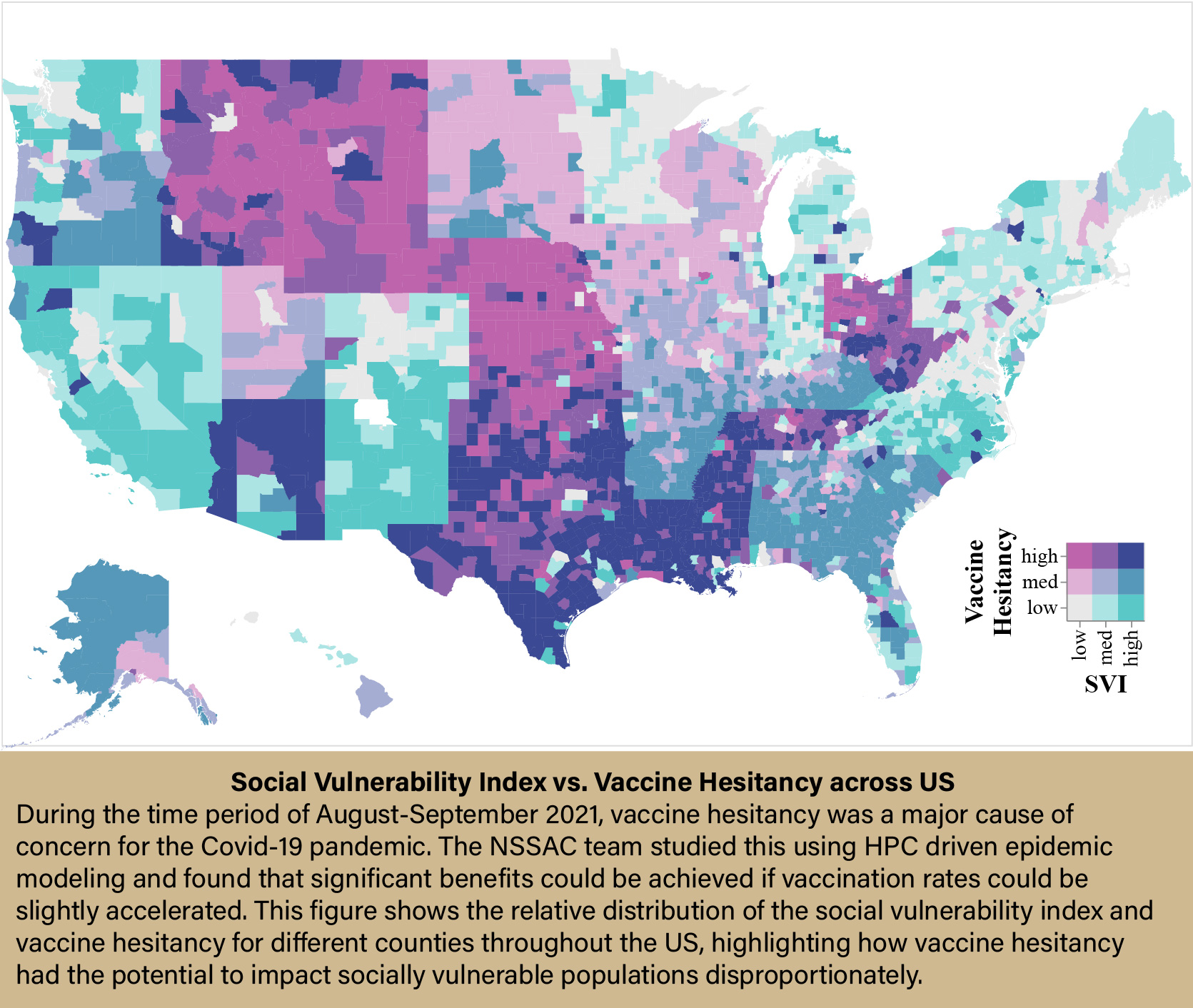
Purdue’s Anvil Supercomputer Assists with COVID-19 Pandemic Response
A research group from the University of Virginia (UVA) utilized Purdue’s Anvil supercomputing cluster to help provide COVID-19 scenario modeling for local, state, federal, and university officials and departments. The team used computer models to predict what might happen with the virus, such as how...
-
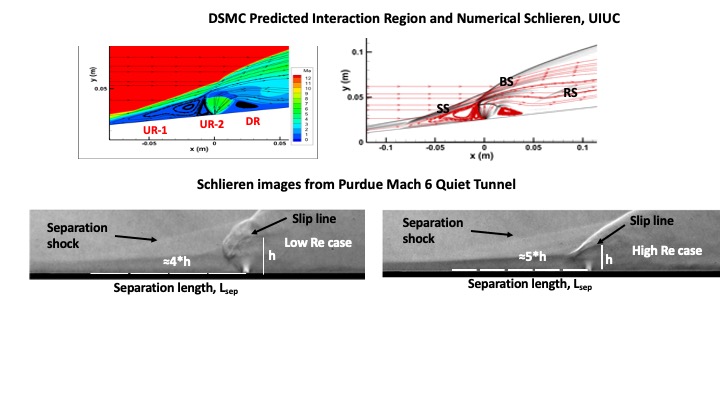
Research team using Anvil in hypersonics research
A team of researchers has been using the Rosen Center for Advanced Computing (RCAC)’s powerful Anvil supercomputer to study gaseous jets in hypersonic crossflow, which is useful for understanding the operations of the systems that are used to steer aircraft and spacecraft in the upper atmosphere. Jo...
-
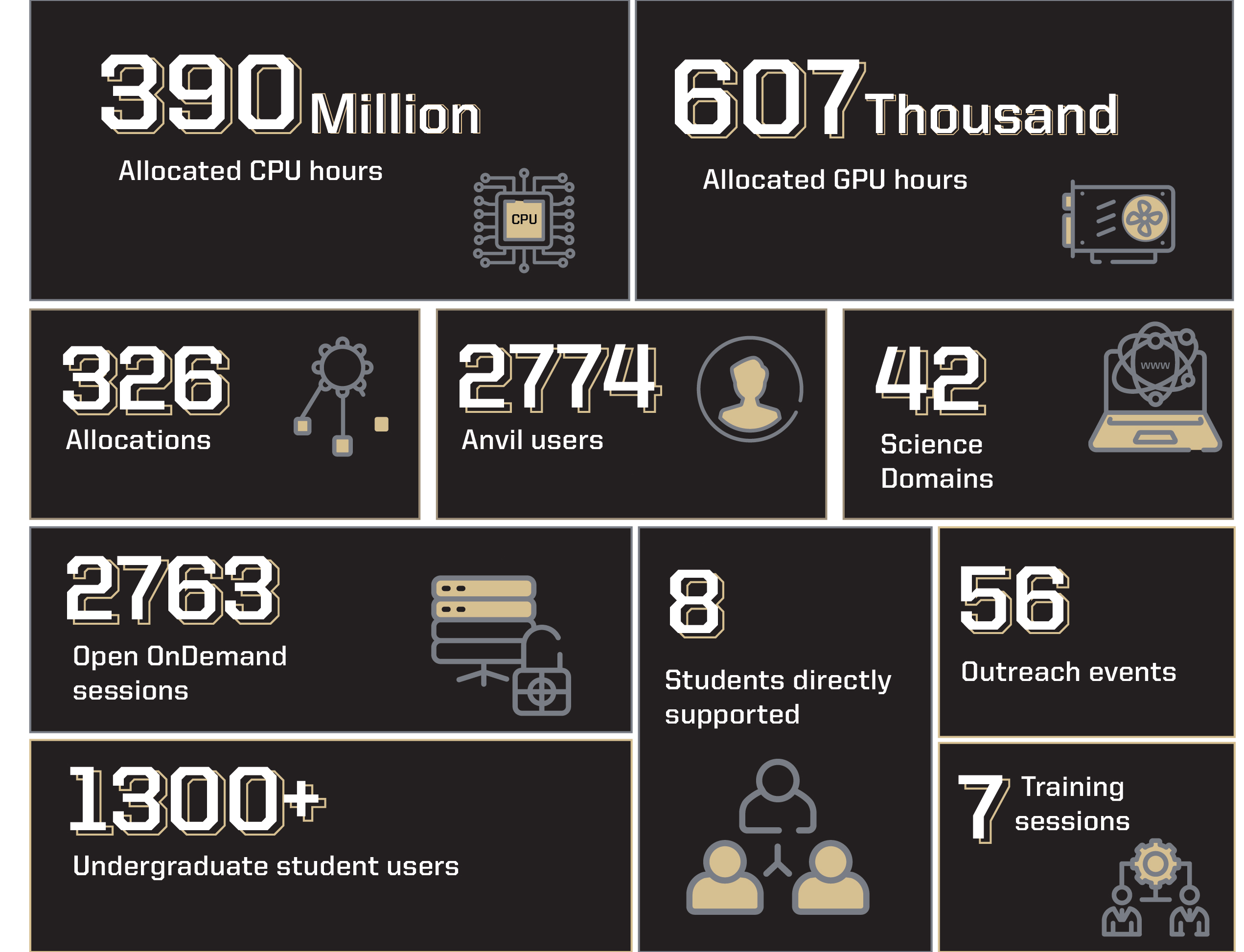
Purdue's Anvil supercomputer enters second year of production
Anvil, Purdue’s most powerful supercomputer, is hammering out progress as it forges ahead into the second year of operations. Funded by a $10 million grant from the National Science Foundation (NSF), Anvil began early user operations in November 2021 and entered production operations in February 202...
-
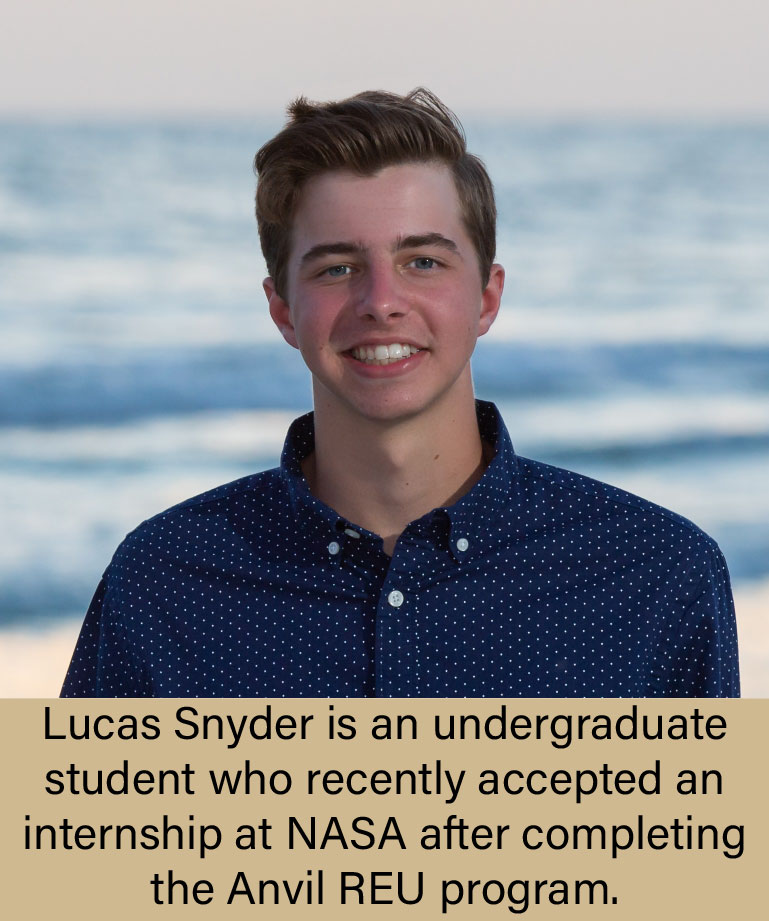
Anvil REU Program helps student achieve NASA internship
The Anvil summer Research Experience for Undergraduates (REU) program has once again proven invaluable for the students who participate in the hands-on learning experience. Lucas Snyder is an undergraduate student at Indiana University who studies Intelligent Systems Engineering, with his specialty...
-
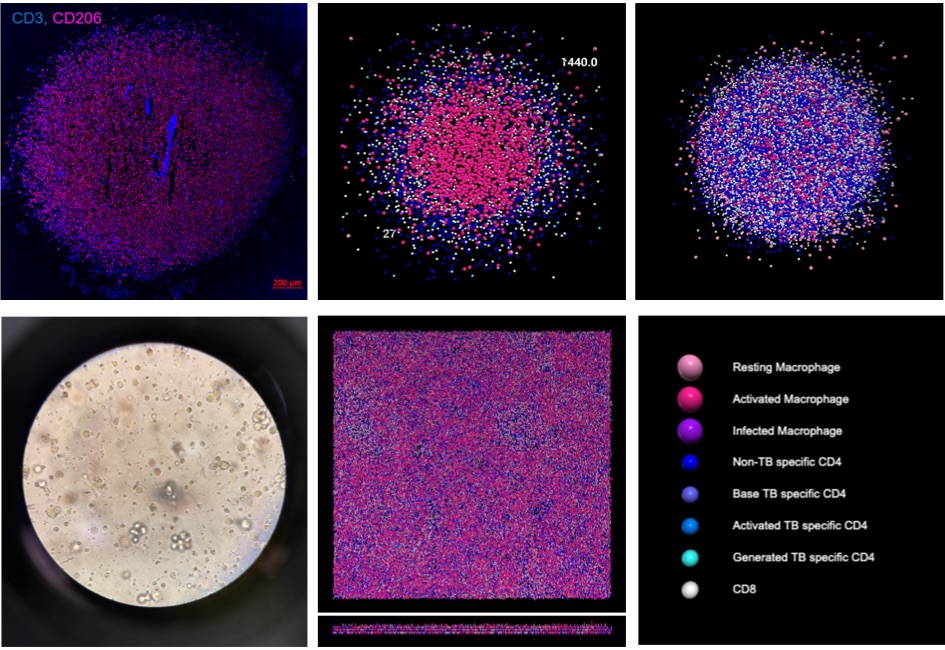
Purdue researchers leading the fight against infectious diseases using Anvil
Purdue researchers are using the Rosen Center for Advanced Computing (RCAC)’s powerful Anvil supercomputer to fight infectious diseases such as tuberculosis (TB). Elsje Pienaar, an associate professor at the Weldon School of Biomedical Engineering, led a team of students, including Lexi Petrucciani,...
-
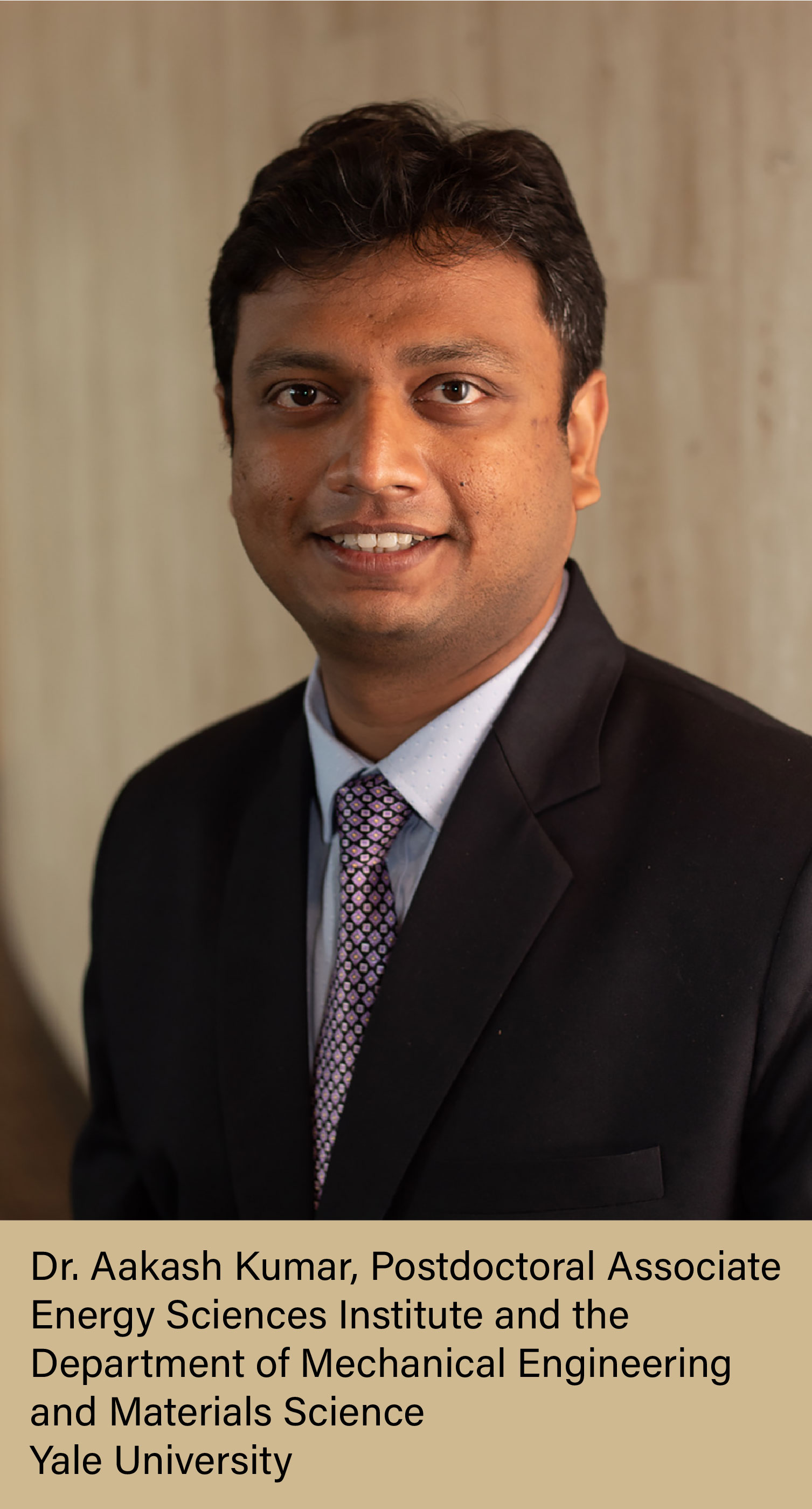
Anvil helps Yale researchers in the search for batteries of the future
Purdue’s Anvil supercomputer has been helping researchers forge a path in developing the batteries of the future. Dr. Aakash Kumar, a postdoctoral associate in the Department of Mechanical Engineering and Materials Science as well as the Energy Sciences Institute at Yale University, utilized the po...
-
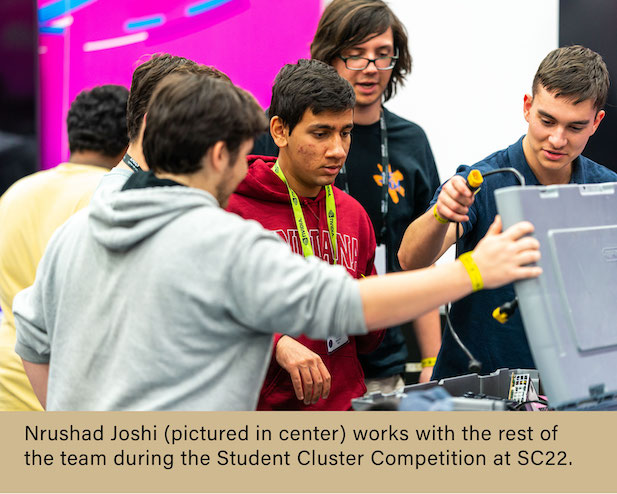
Anvil REU Program has major impact on student success
After only one year, the Anvil summer Research Experience for Undergraduates (REU) program is already impacting the lives and careers of the students who participated. Nrushad Joshi, an undergraduate student at Indiana University, recently accepted an offer to intern at Oak Ridge National Laborator...
-
Adverse drug effects are thought to be vastly underreported, but a team from Purdue’s College of Pharmacy is working with the Rosen Center for Advanced Computing (RCAC) to use artificial intelligence to change that. RCAC senior research data scientist Sarah Rodenbeck partnered with Kyle Hultgren, th...
-
Anvil accelerates sustainability and photosynthesis research
Purdue’s Anvil supercomputer is helping a Michigan State research team study processes associated with photosynthesis and plant metabolism, and apply those insights to facilitate more efficient energy conversion to meet today’s sustainability challenges. Josh Vermaas, an assistant professor at Michi...
-
Anvil used to train cancer researchers in big data analysis
Purdue’s powerful Anvil supercomputer is being used to train a group of cancer researchers – from graduate students to professors and practicing physicians – on big data management, analysis and visualization skills. Min Zhang, professor of statistics, used Anvil in her 2022 Big Data Training for Ca...
-
Anvil accelerates genome sequencing for studying psychiatric disorders
Purdue’s Anvil supercomputer has helped one research team better understand how DNA changes relate to psychiatric disorders such as schizophrenia and post-traumatic stress disorder. Richard Wilton, an associate research scientist at Johns Hopkins University, and his collaborators used Anvil to carry...
-
Purdue’s Anvil supercomputer aids in drug discovery
Purdue’s powerful new Anvil supercomputer is helping one researcher accelerate his biomolecular simulations and unlock new treatments for heart disease. Yinglong Miao, an assistant professor at the Center for Computational Biology and Department of Molecular Biosciences at the University of Kansas,...
-
Purdue's Anvil supercomputer now available for use
Purdue University's powerful new Anvil supercomputer, funded by the National Science Foundation and built in partnership with Dell and AMD, is now available for use. Anvil will significantly increase the computing capacity available to users of the NSF’s Extreme Science and Engineering Discovery Env...
Anvil is supported by the National Science Foundation under Grant No. 2005632.
